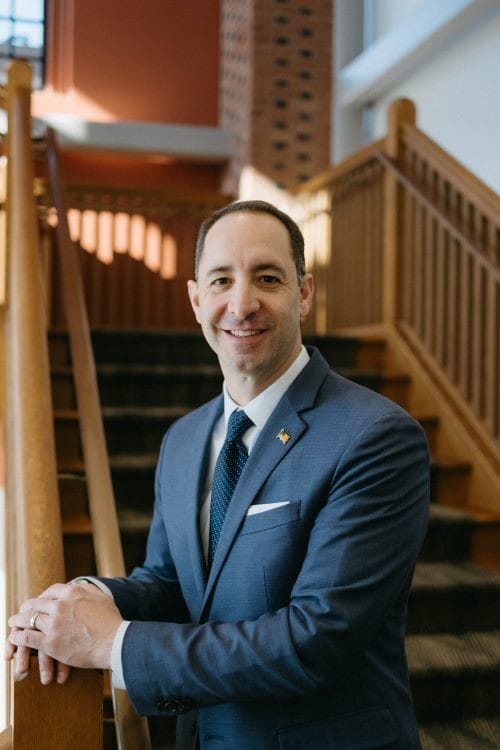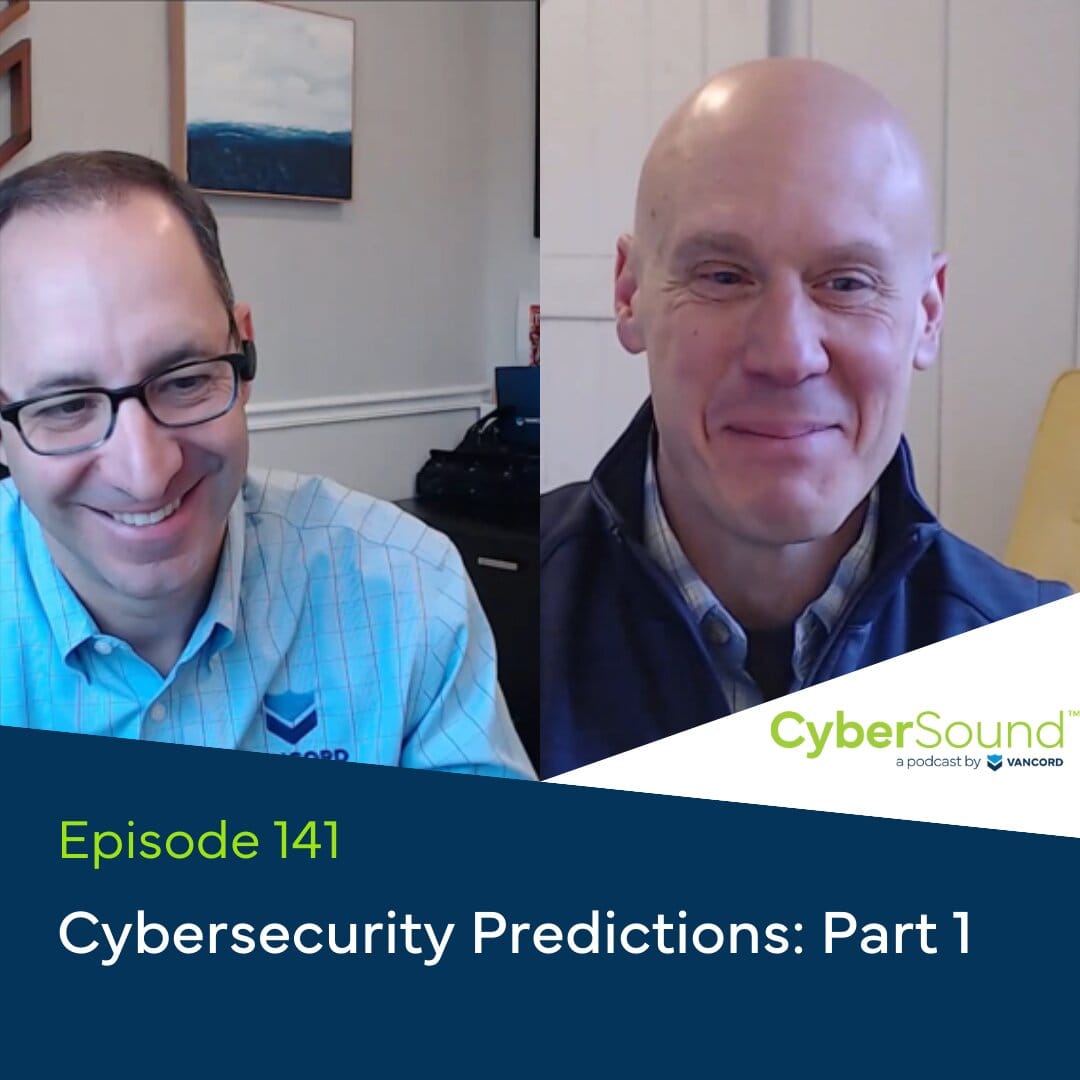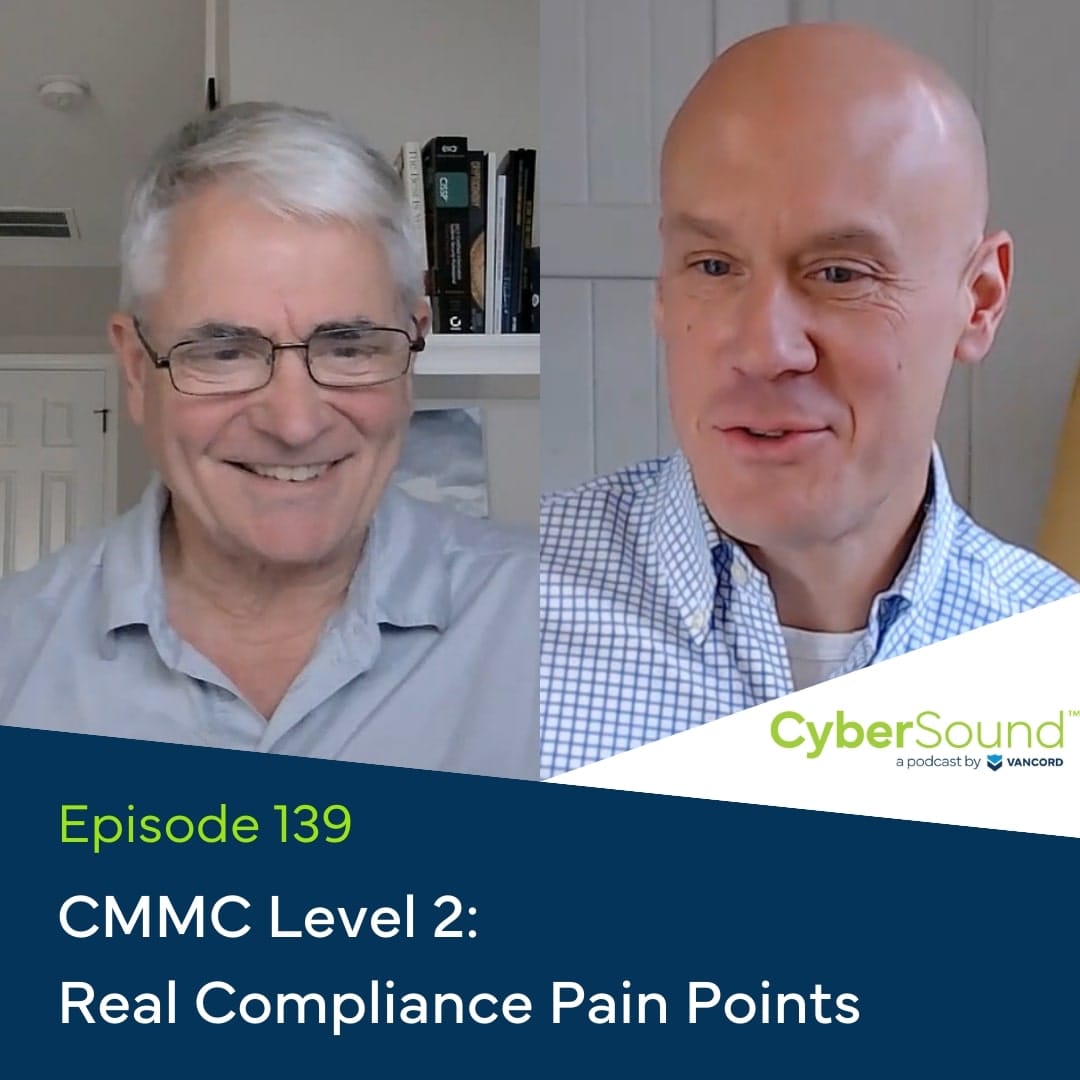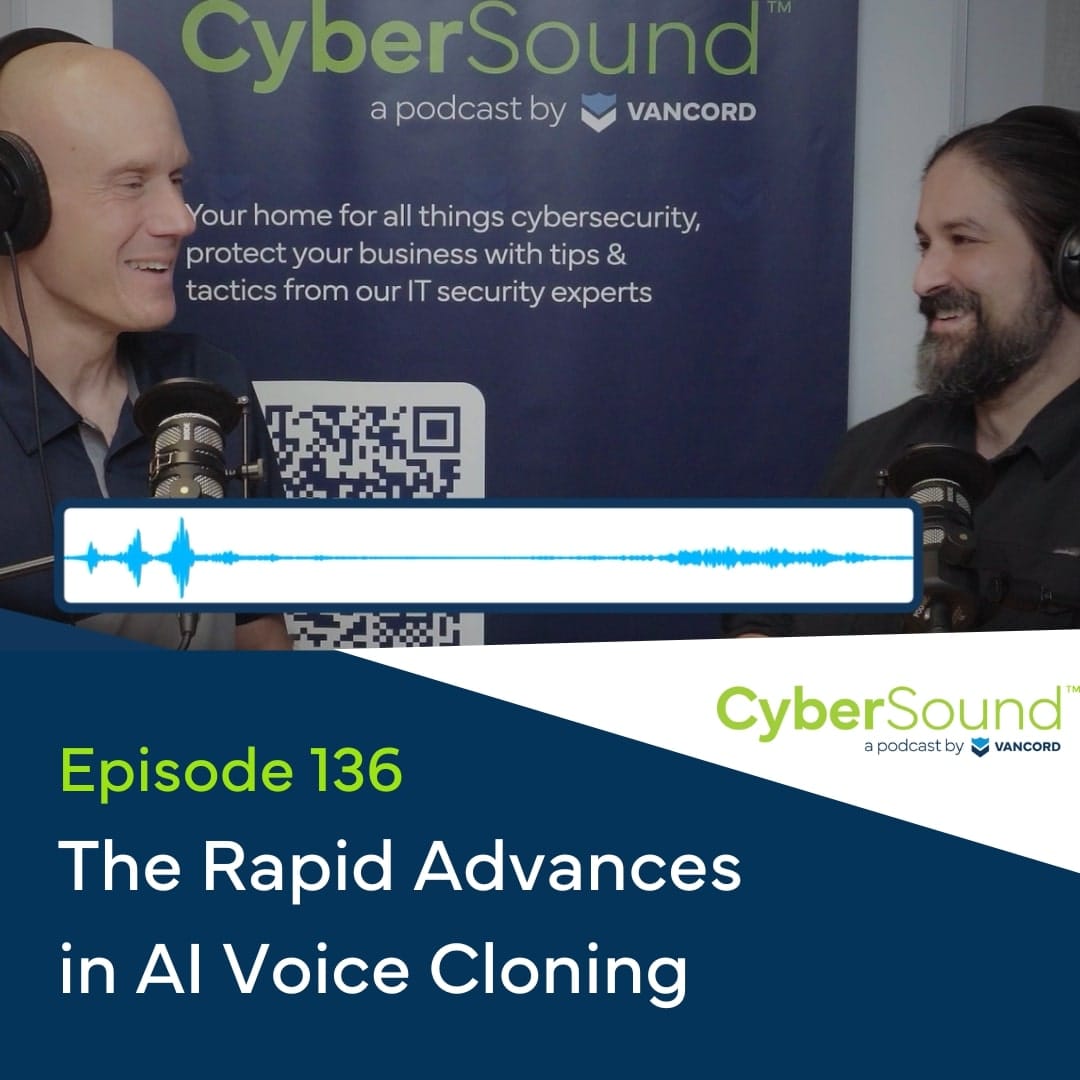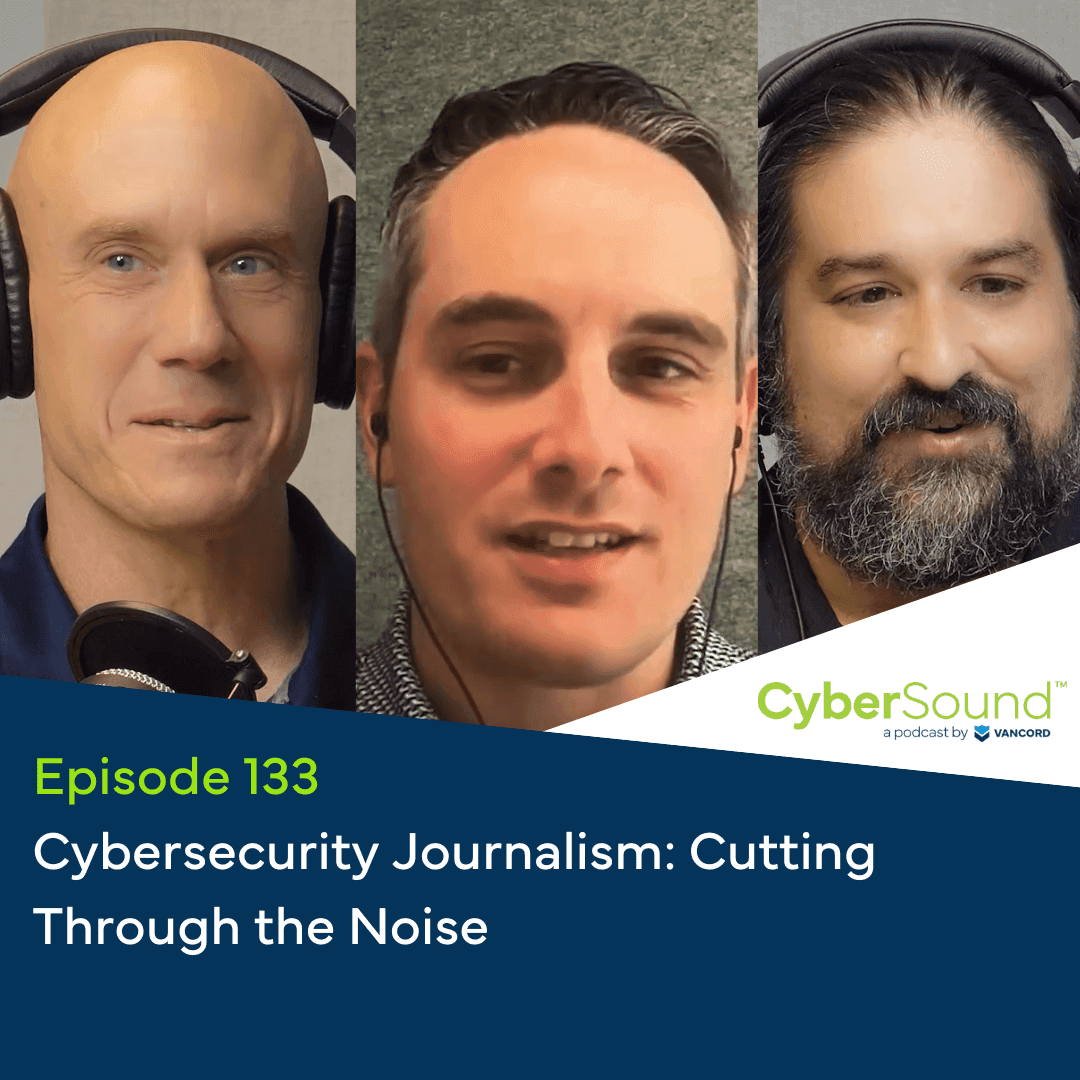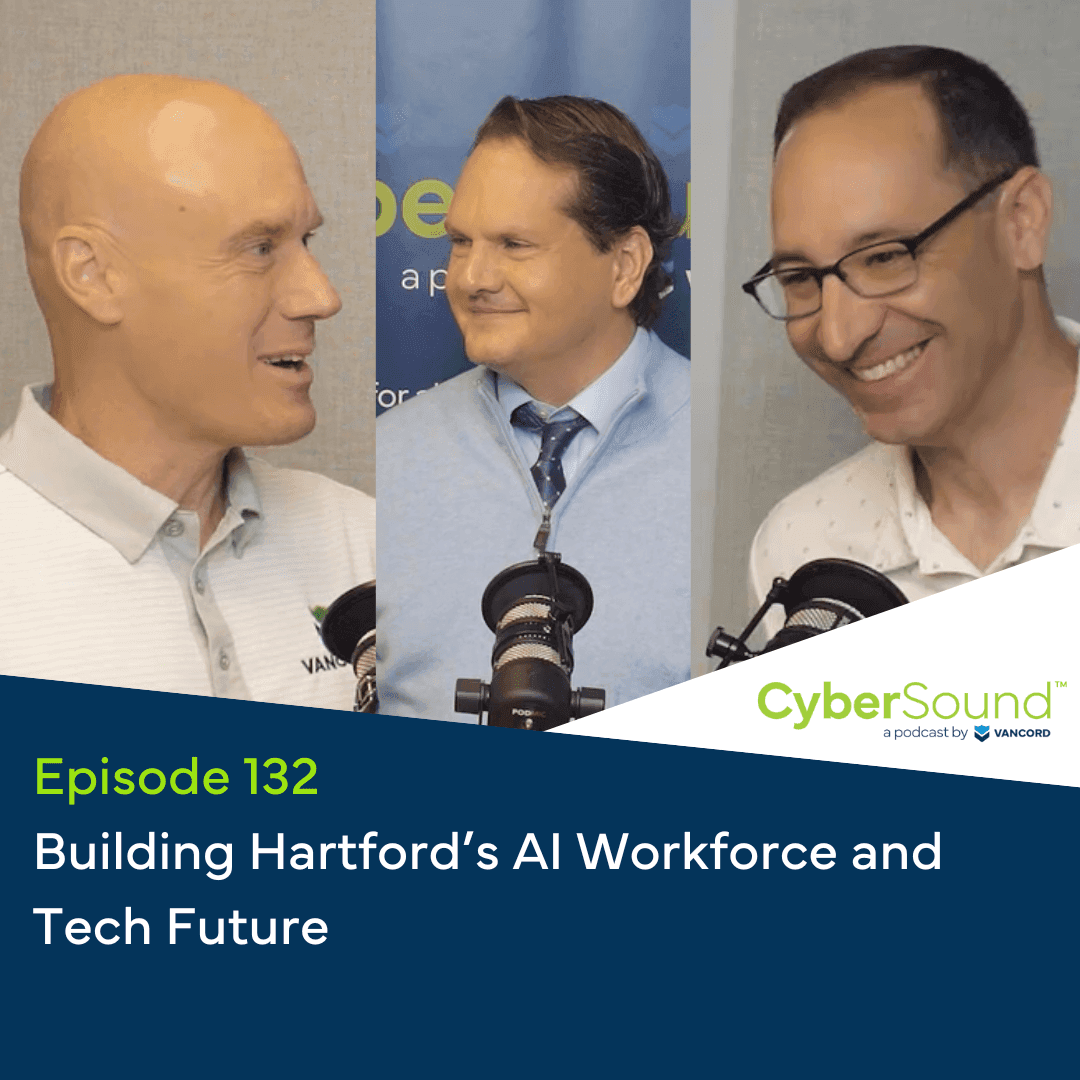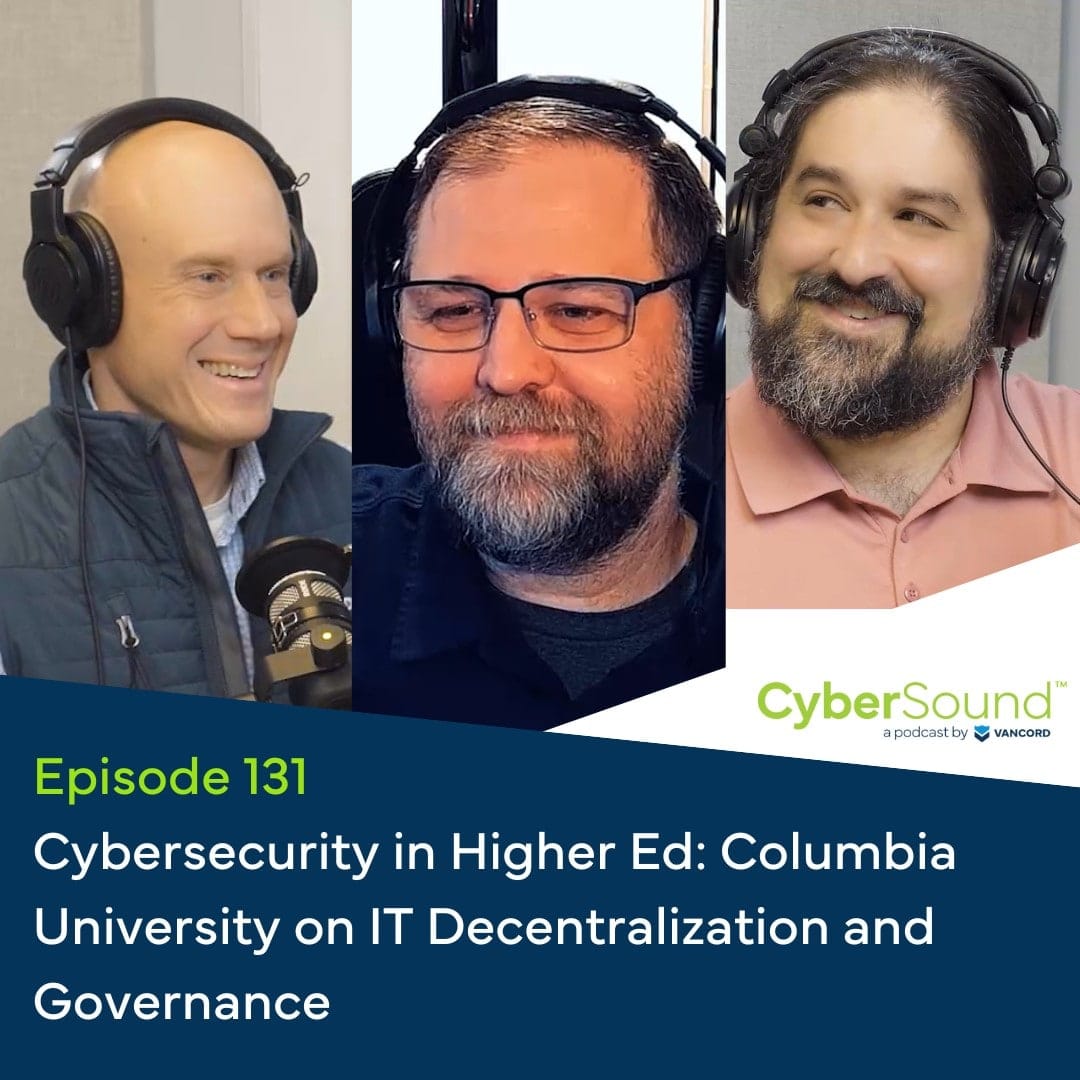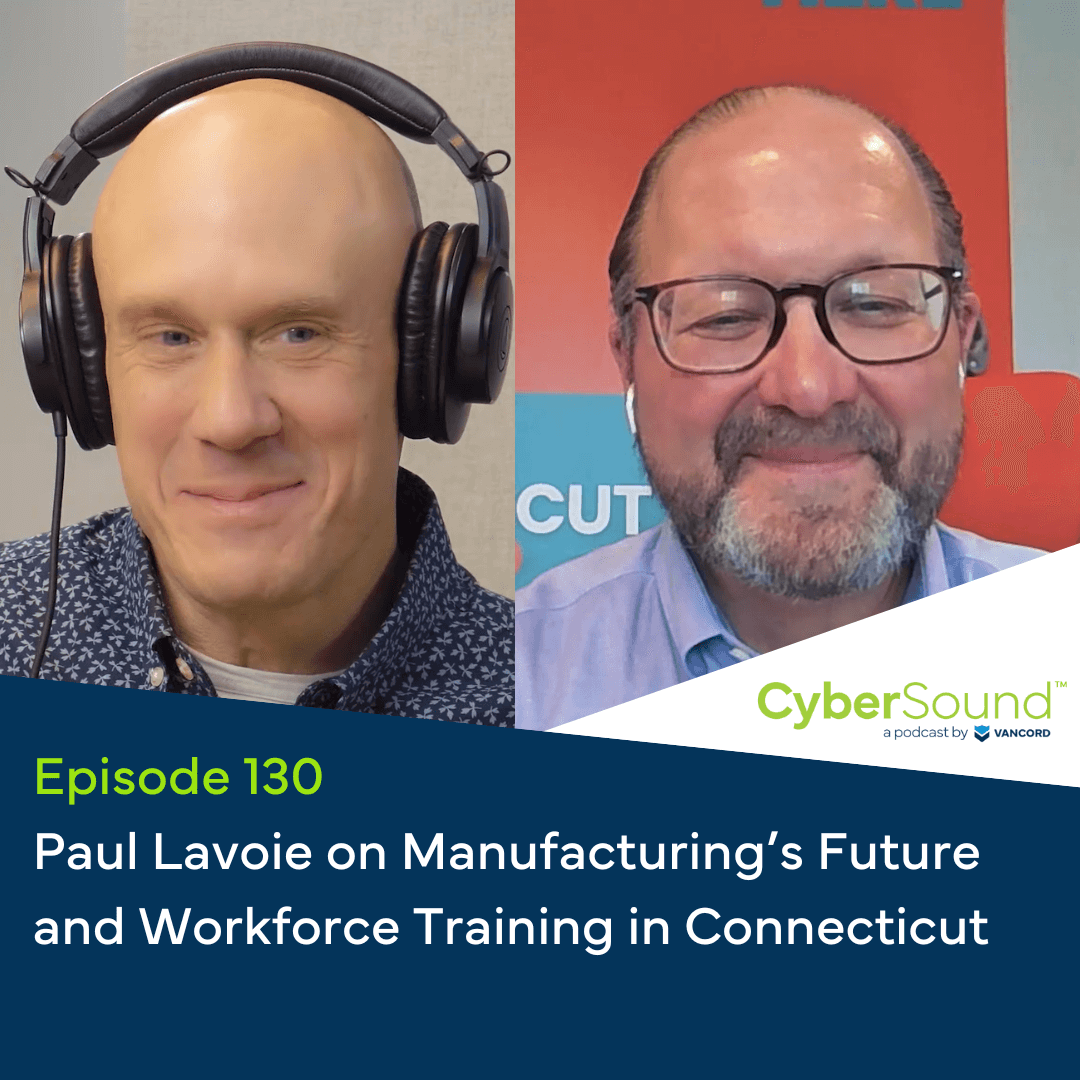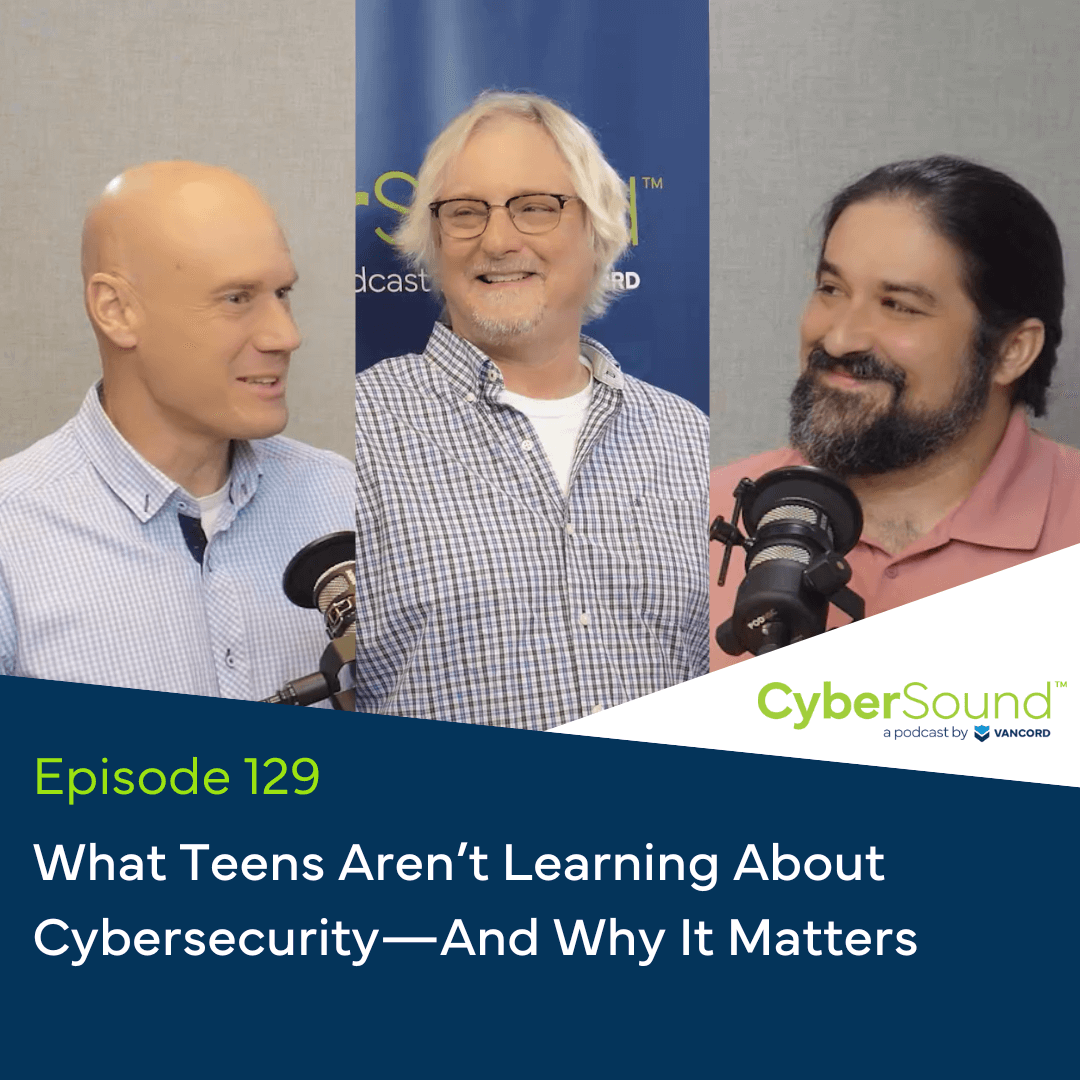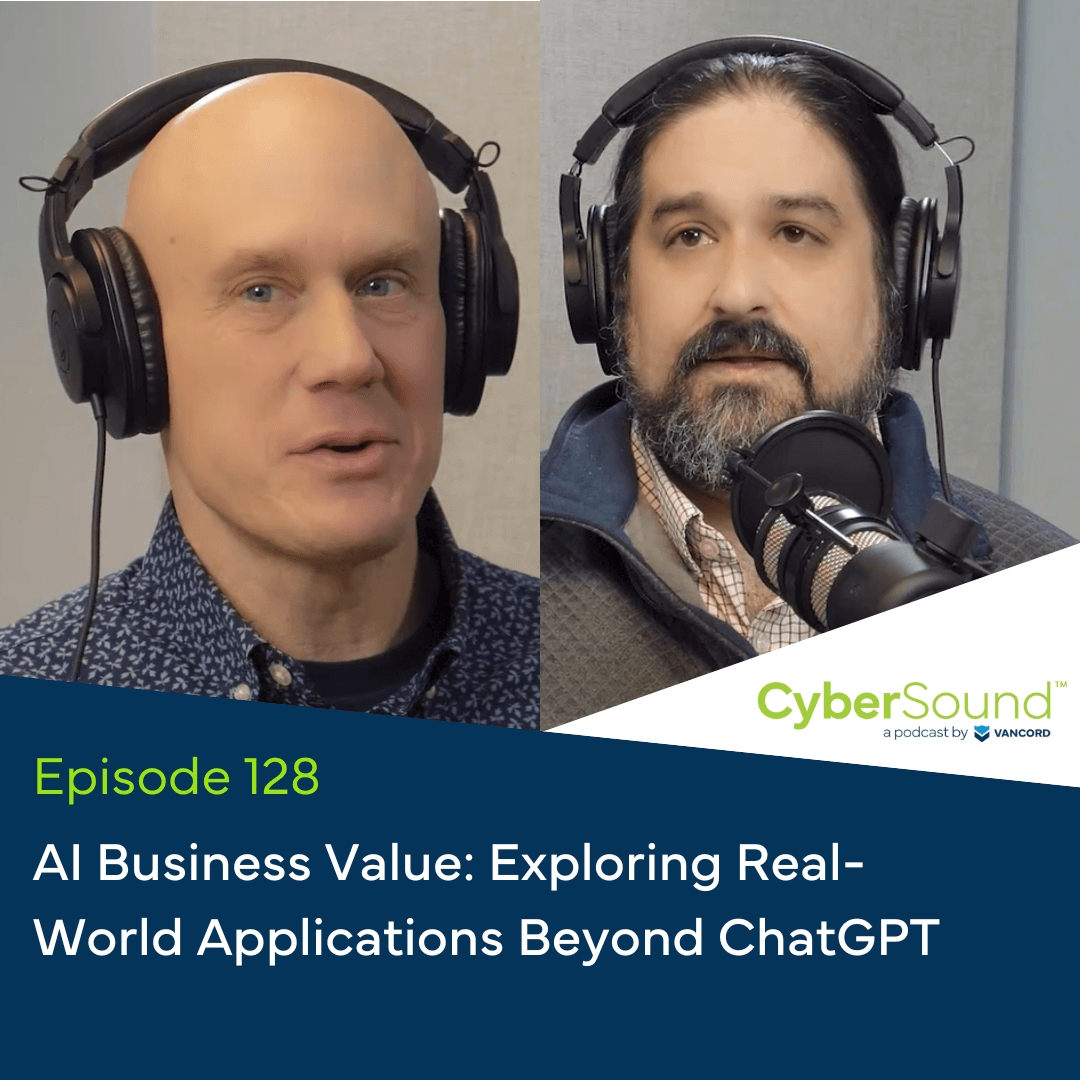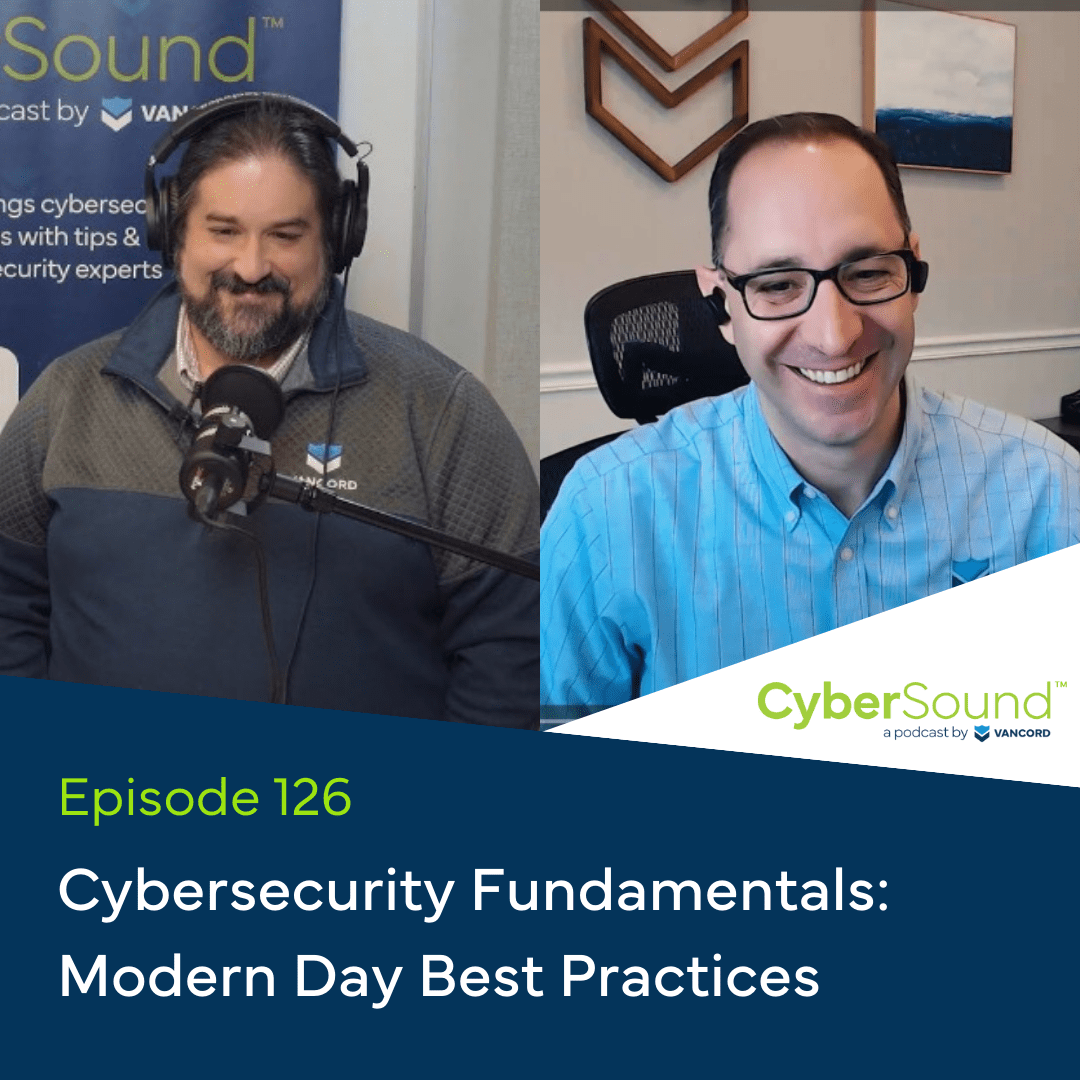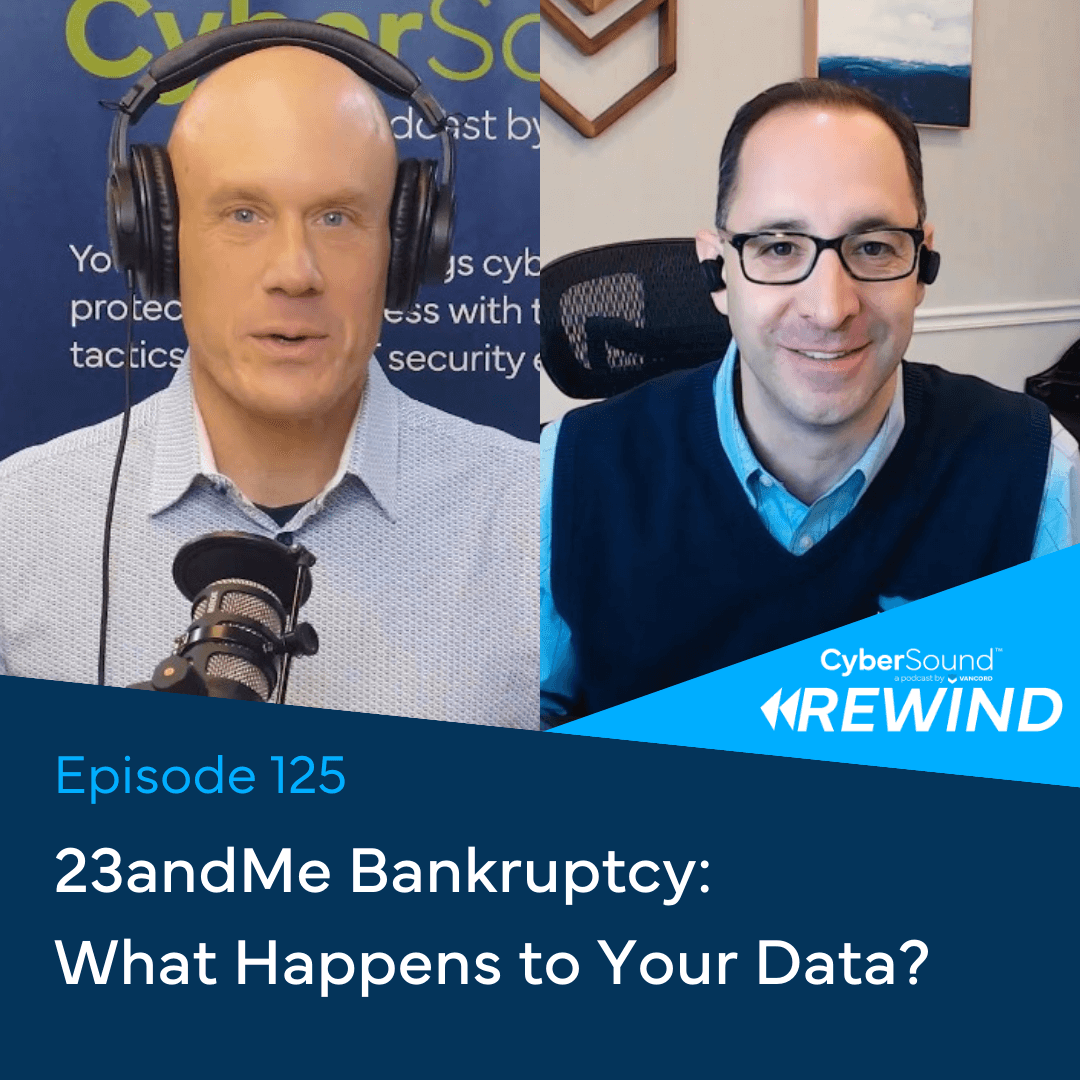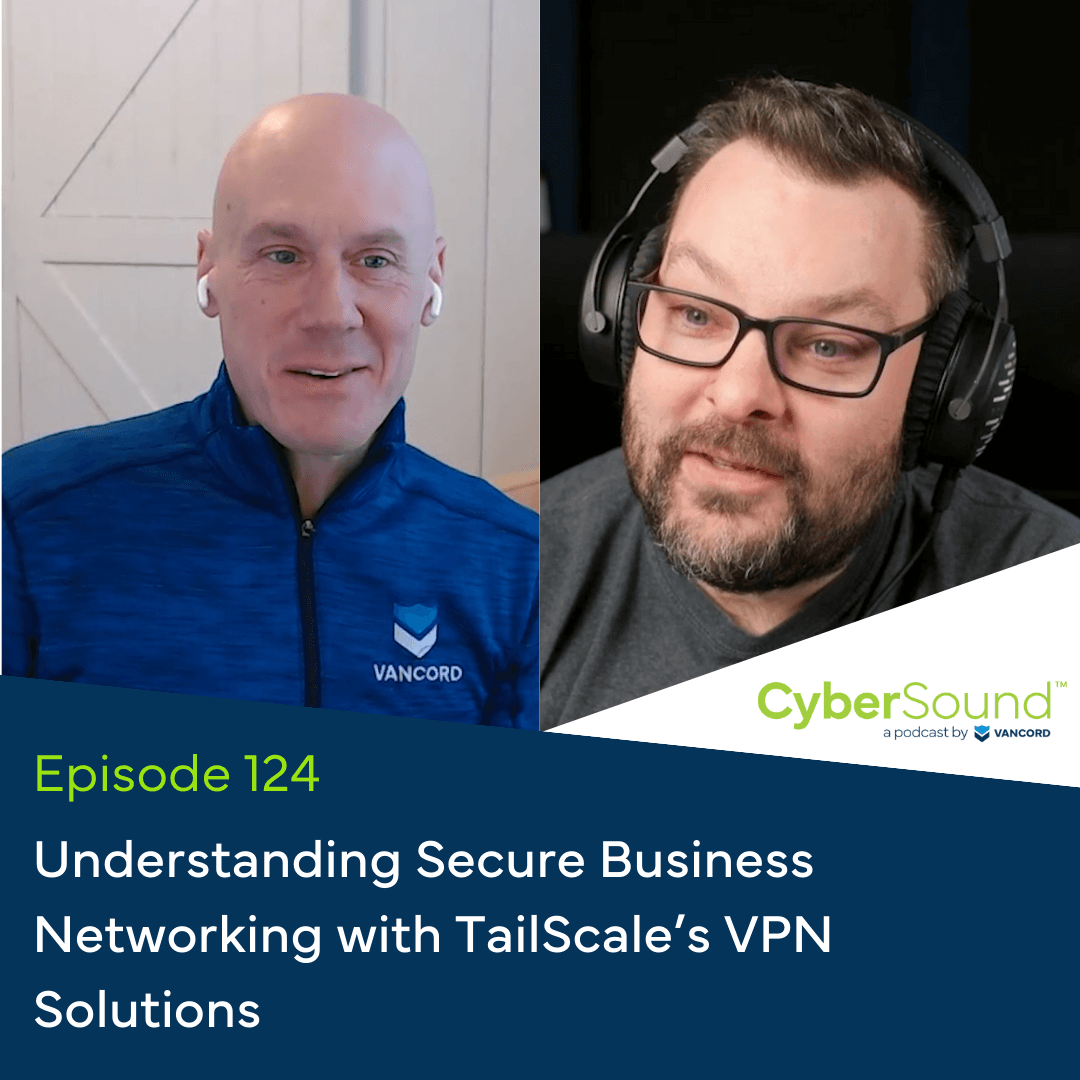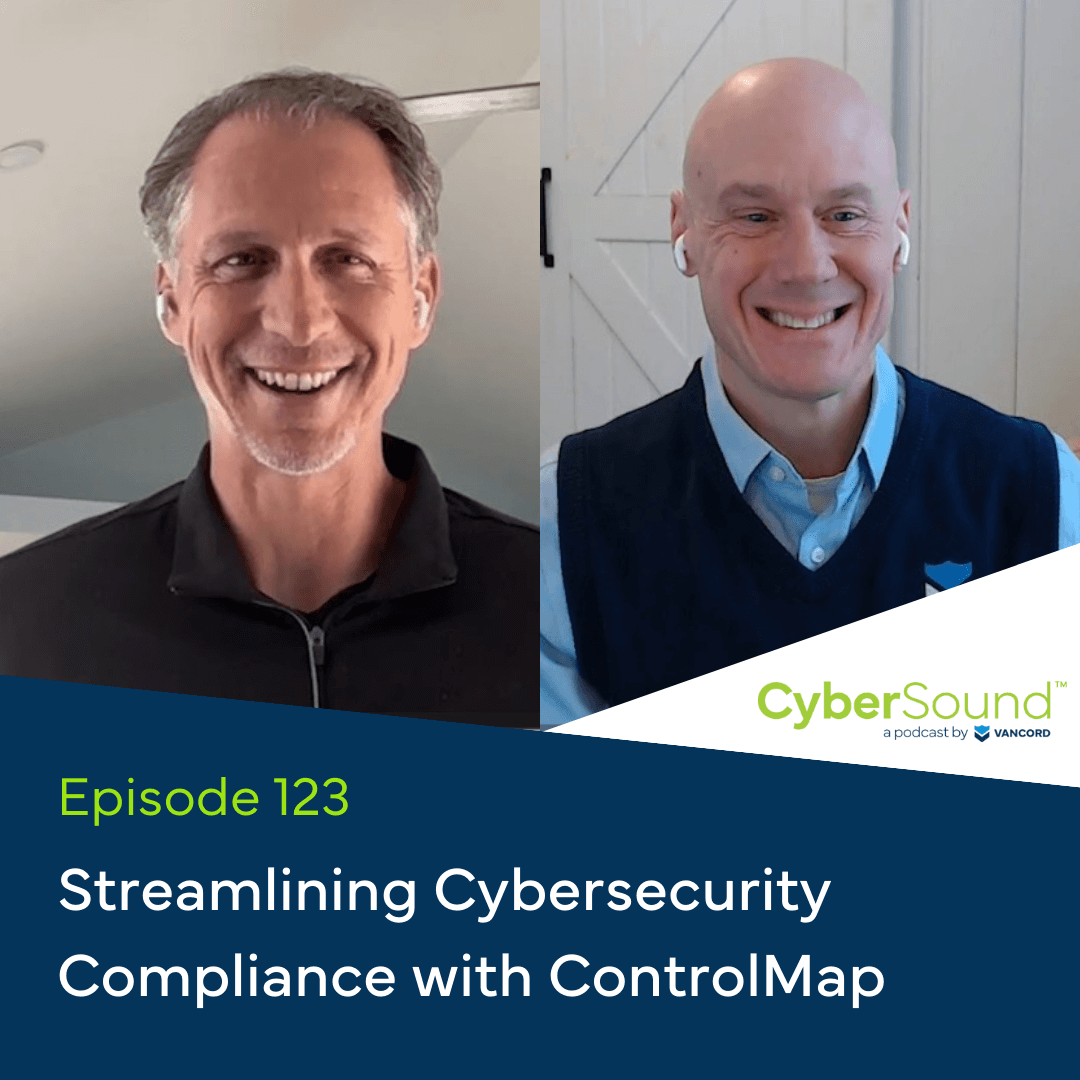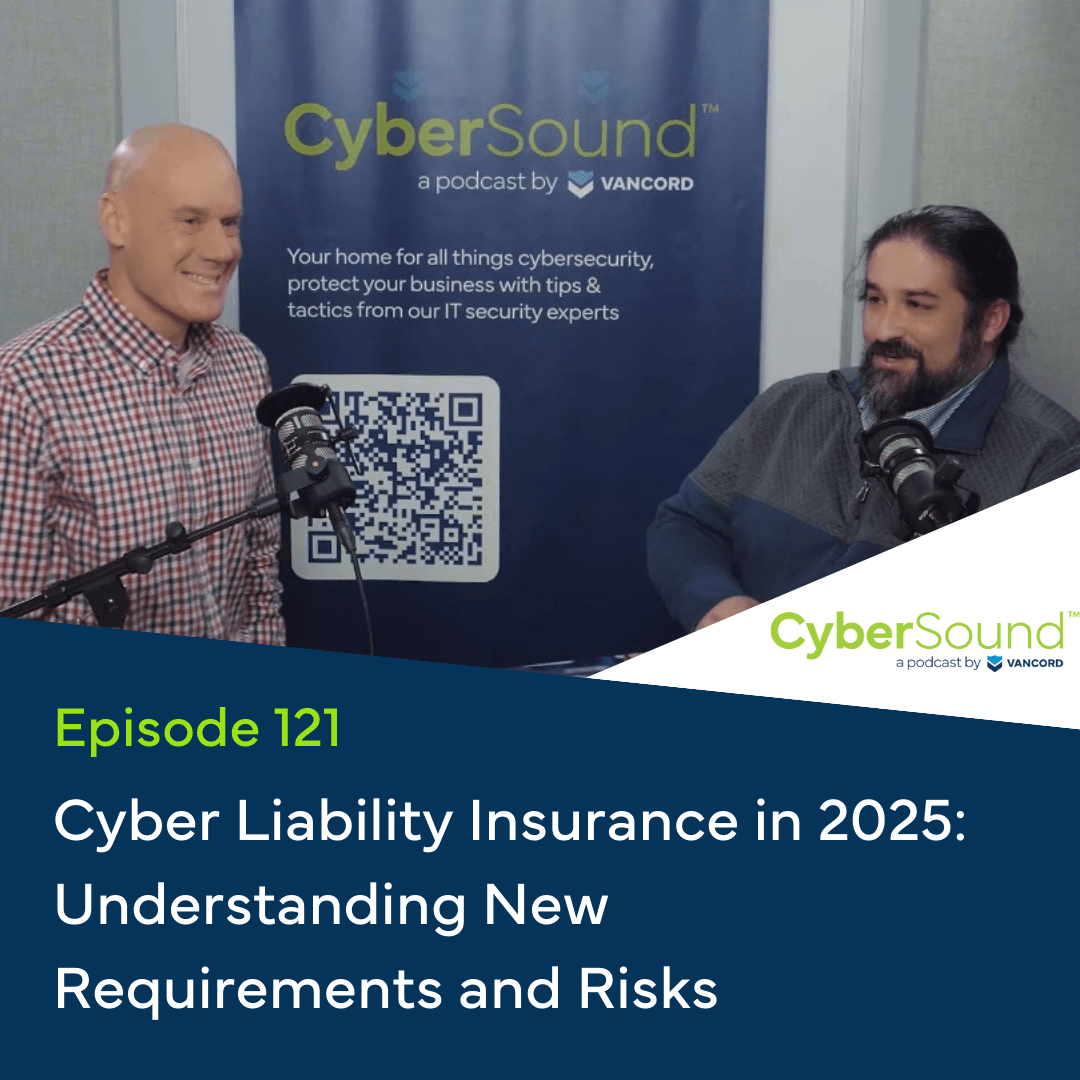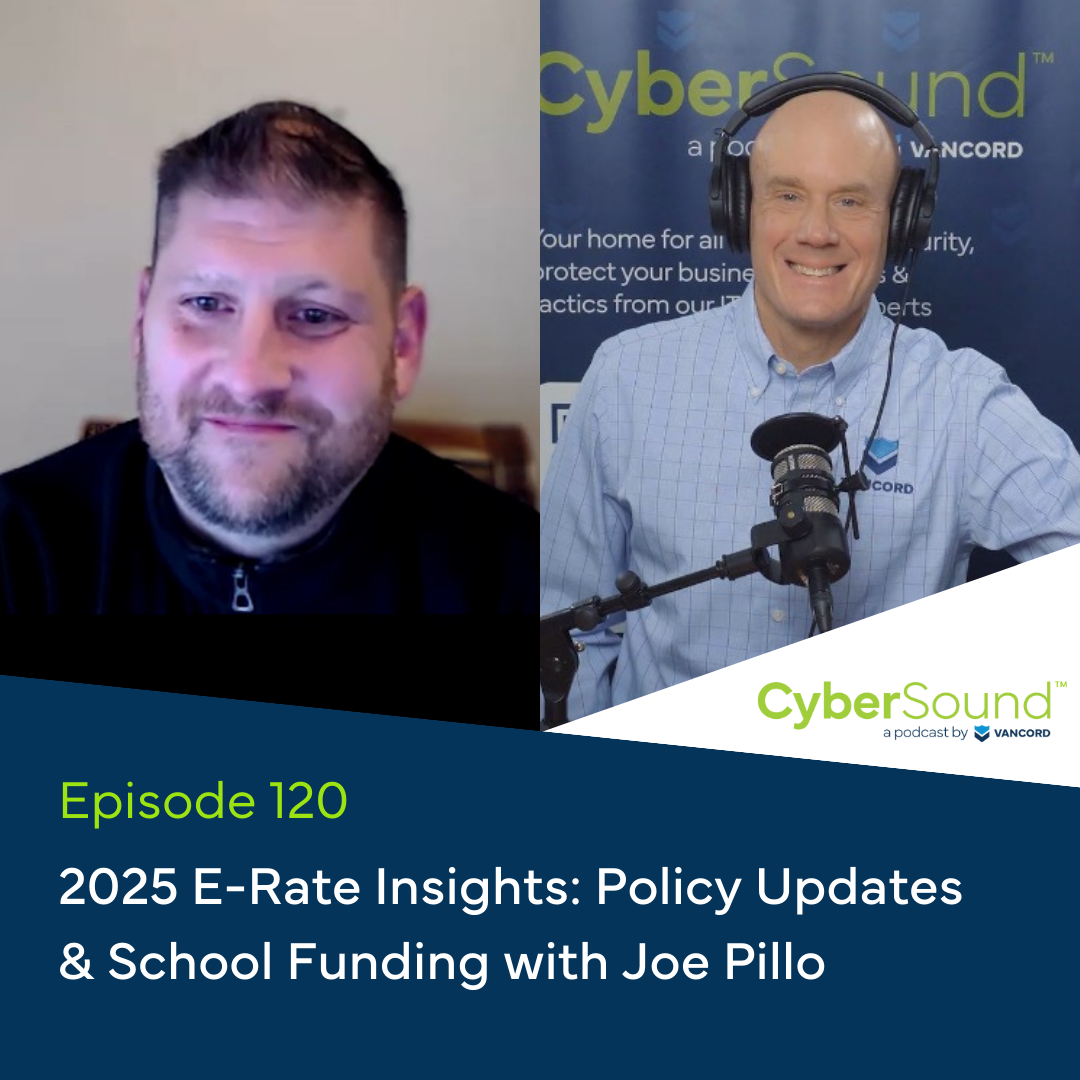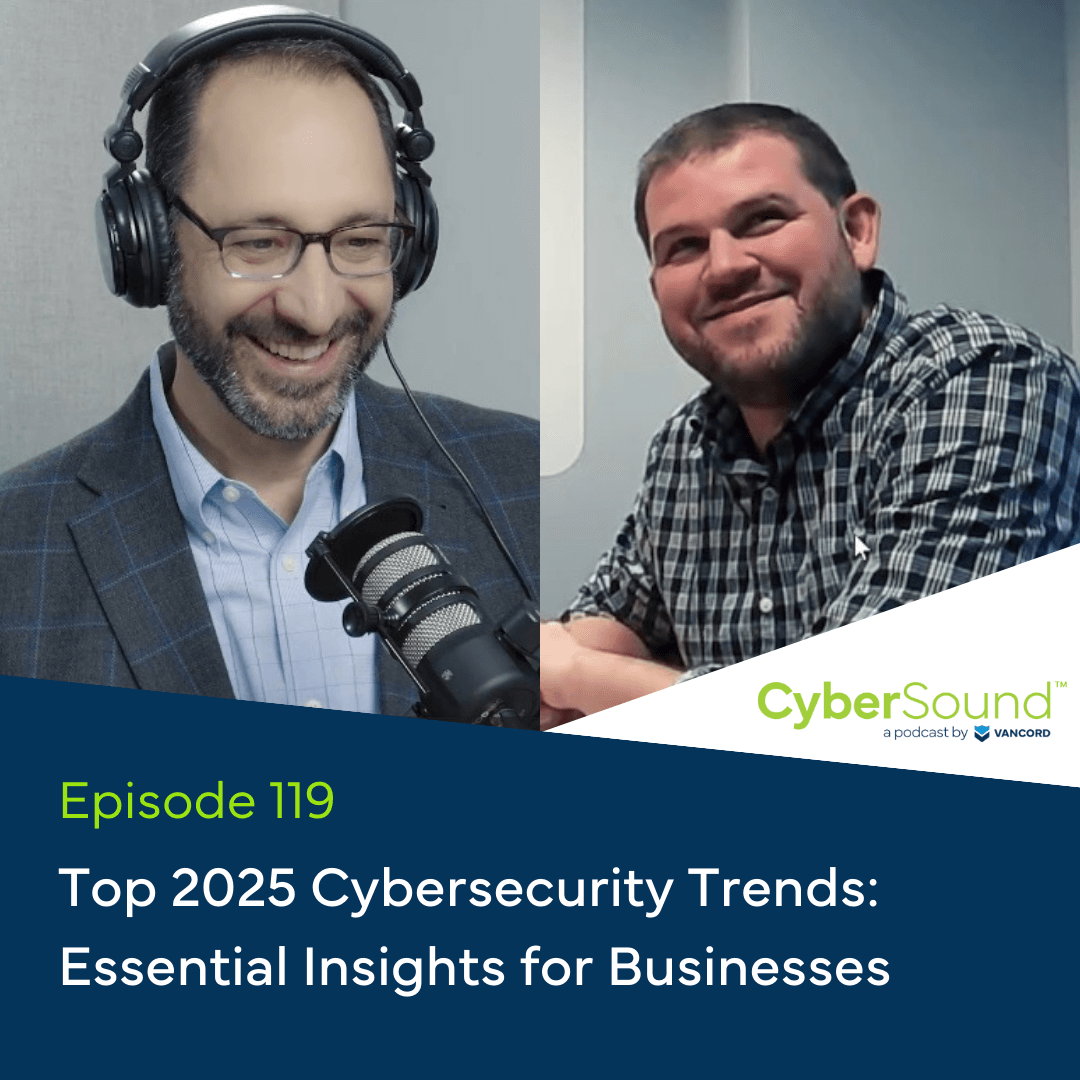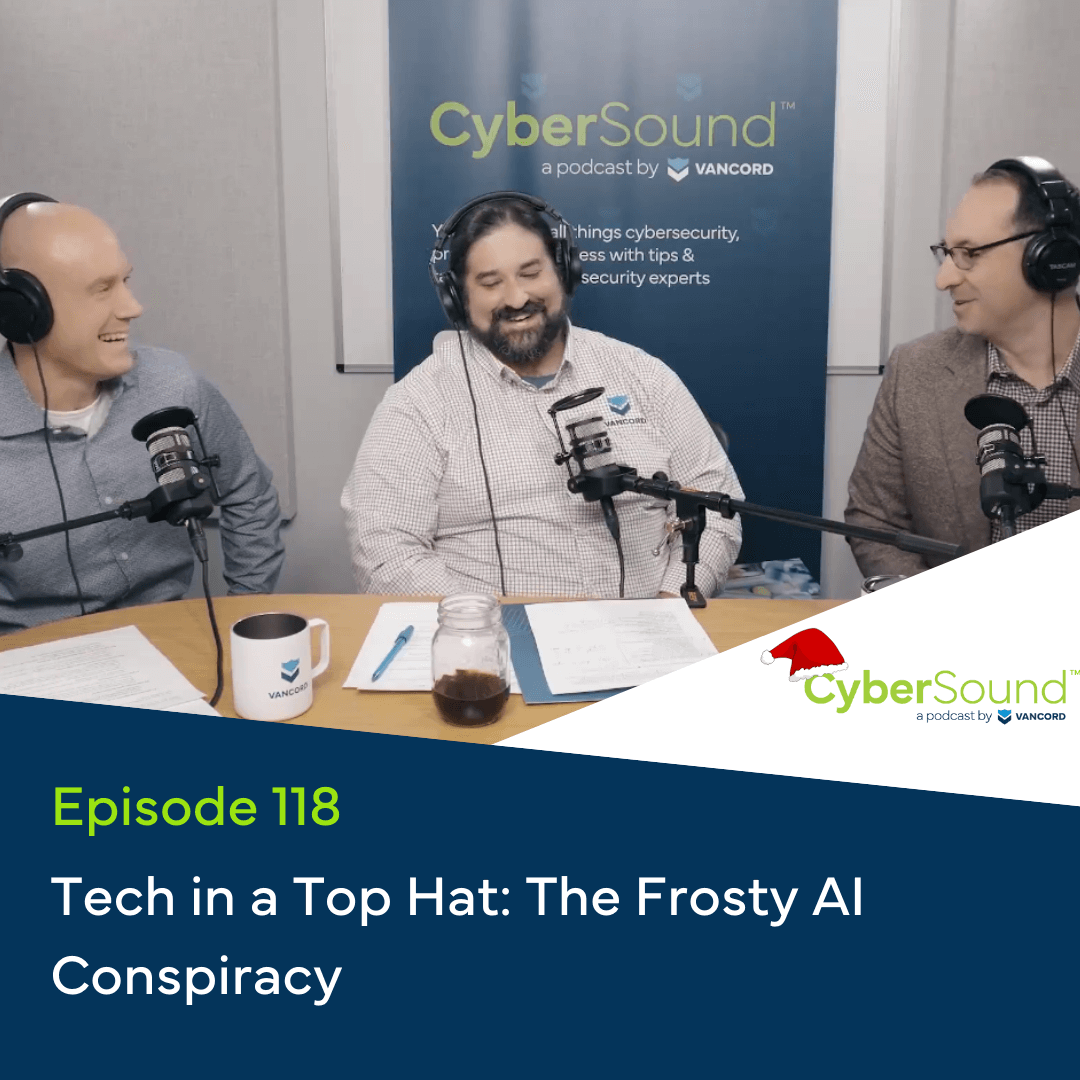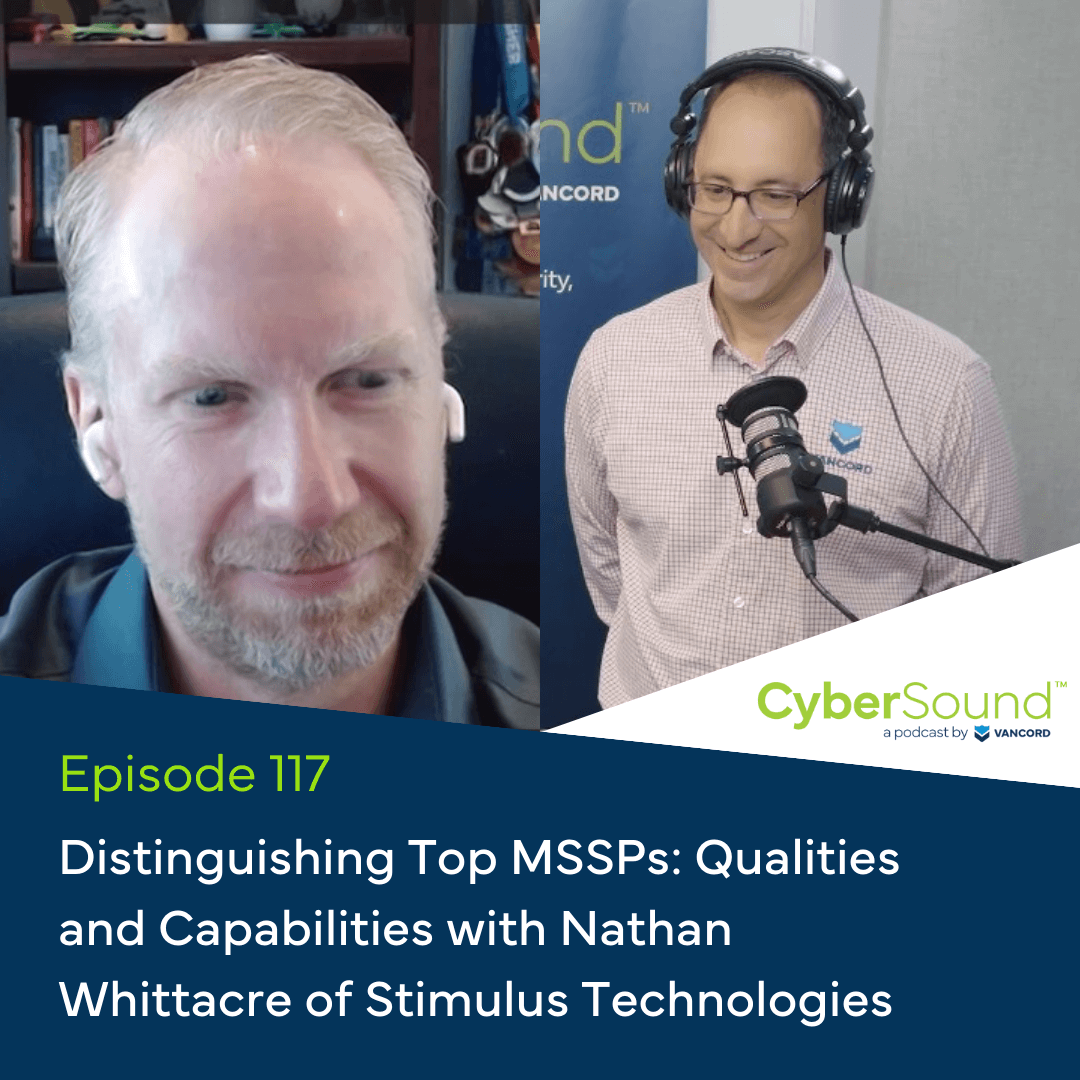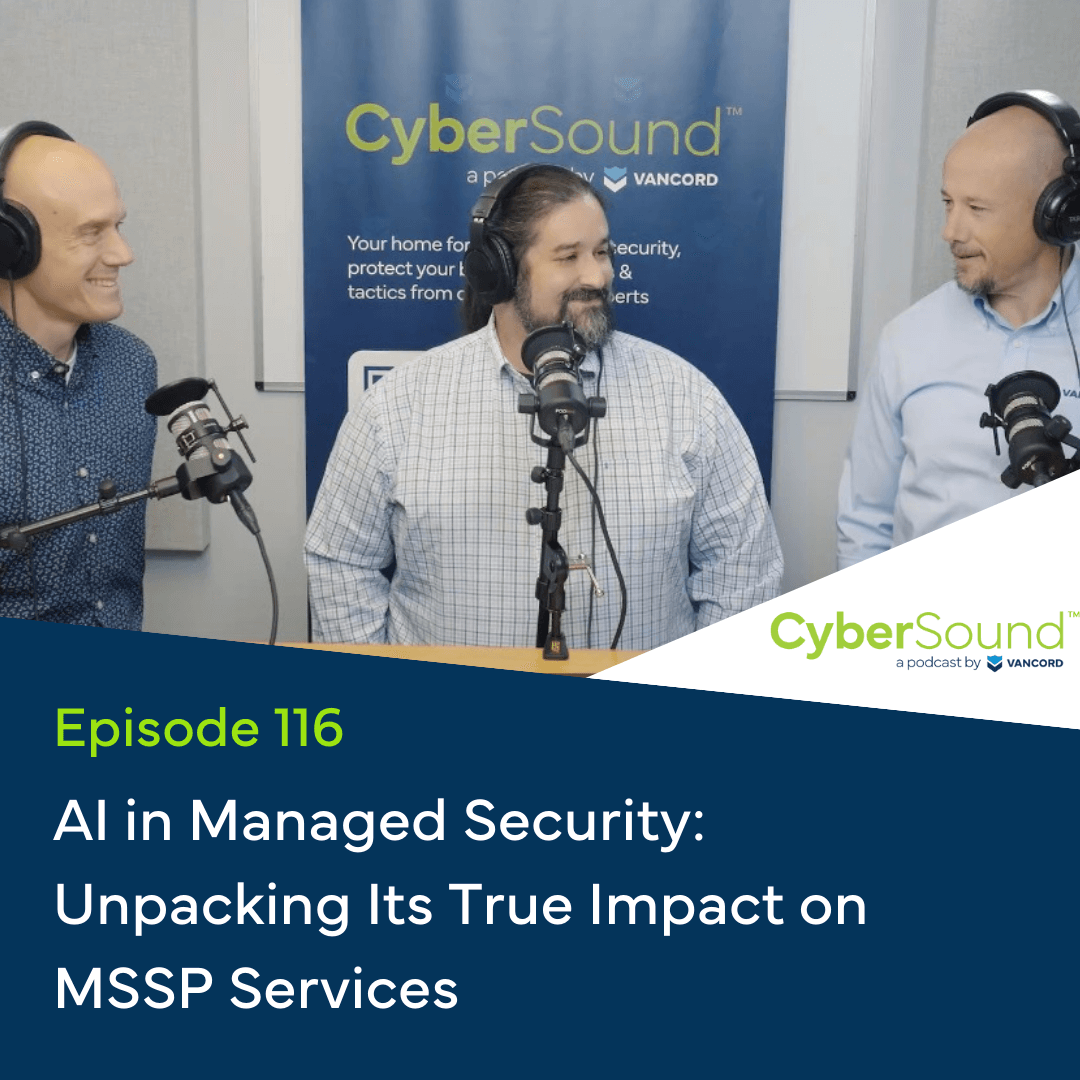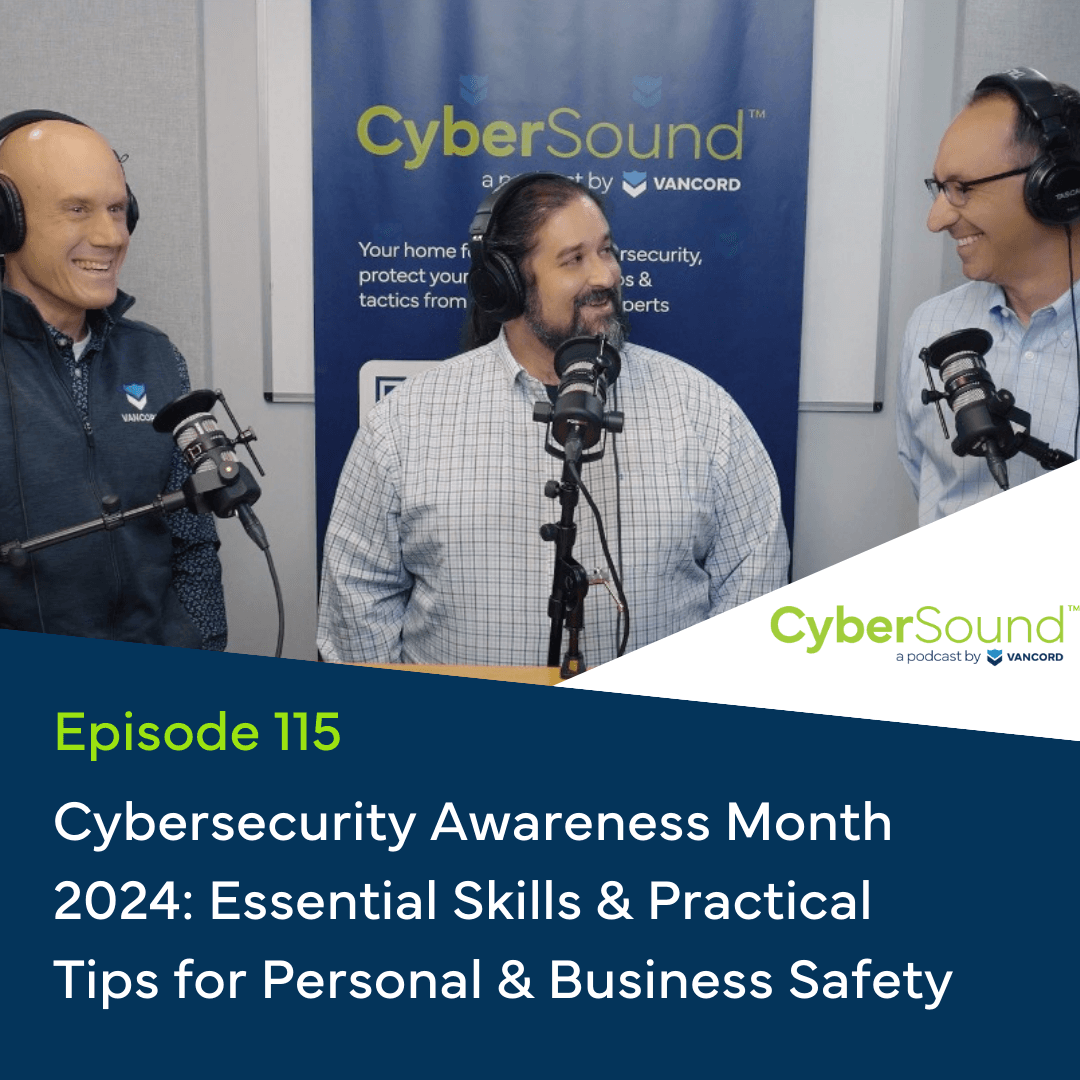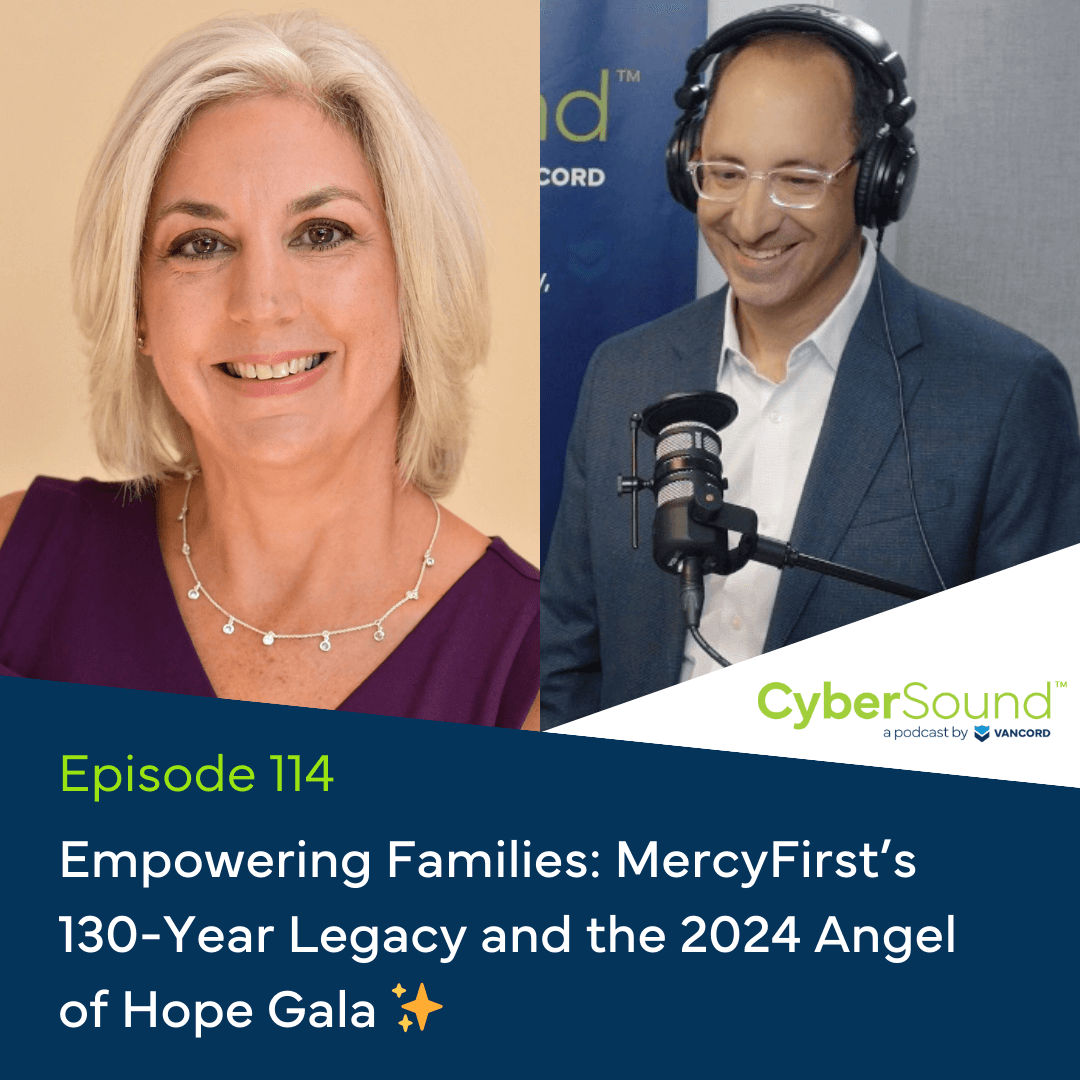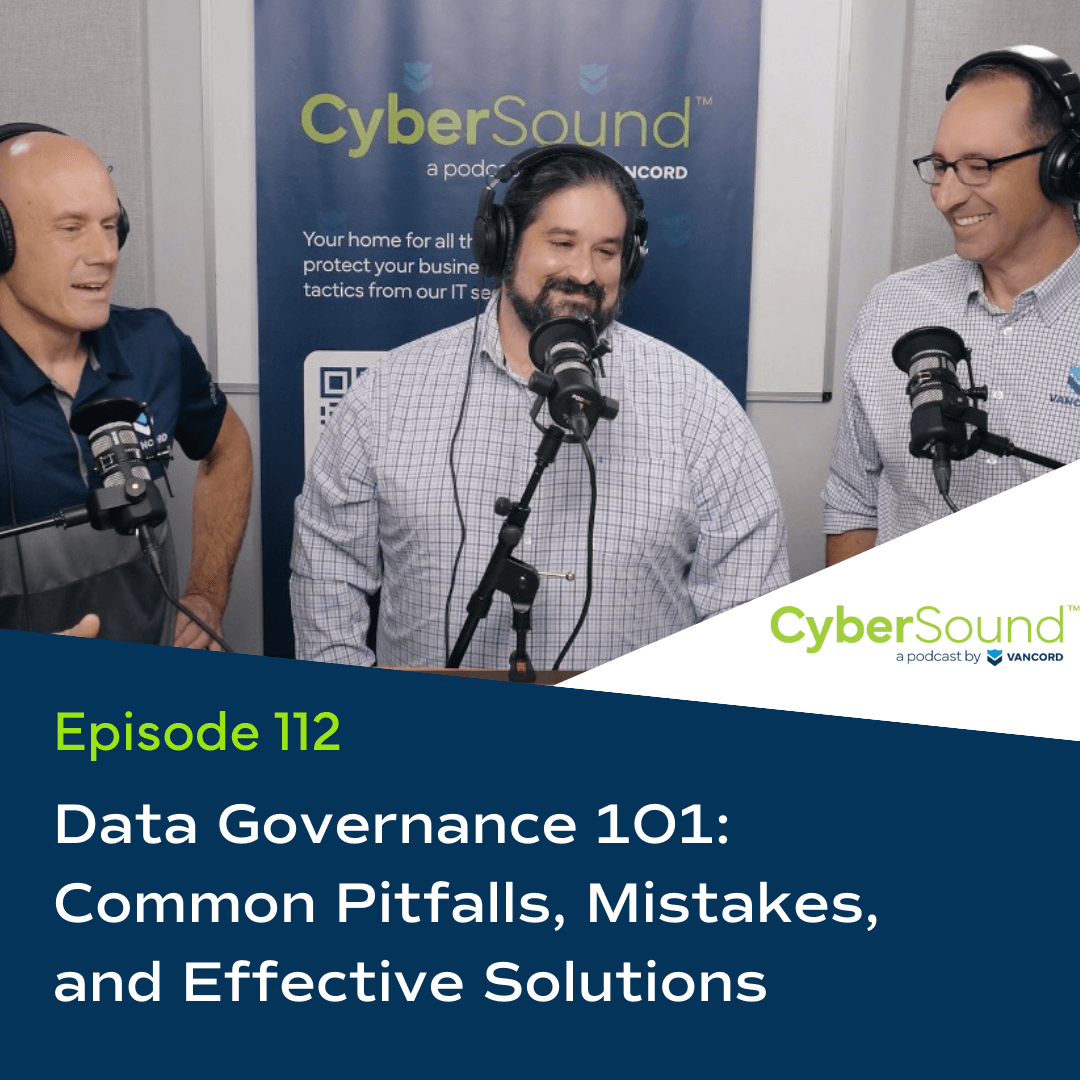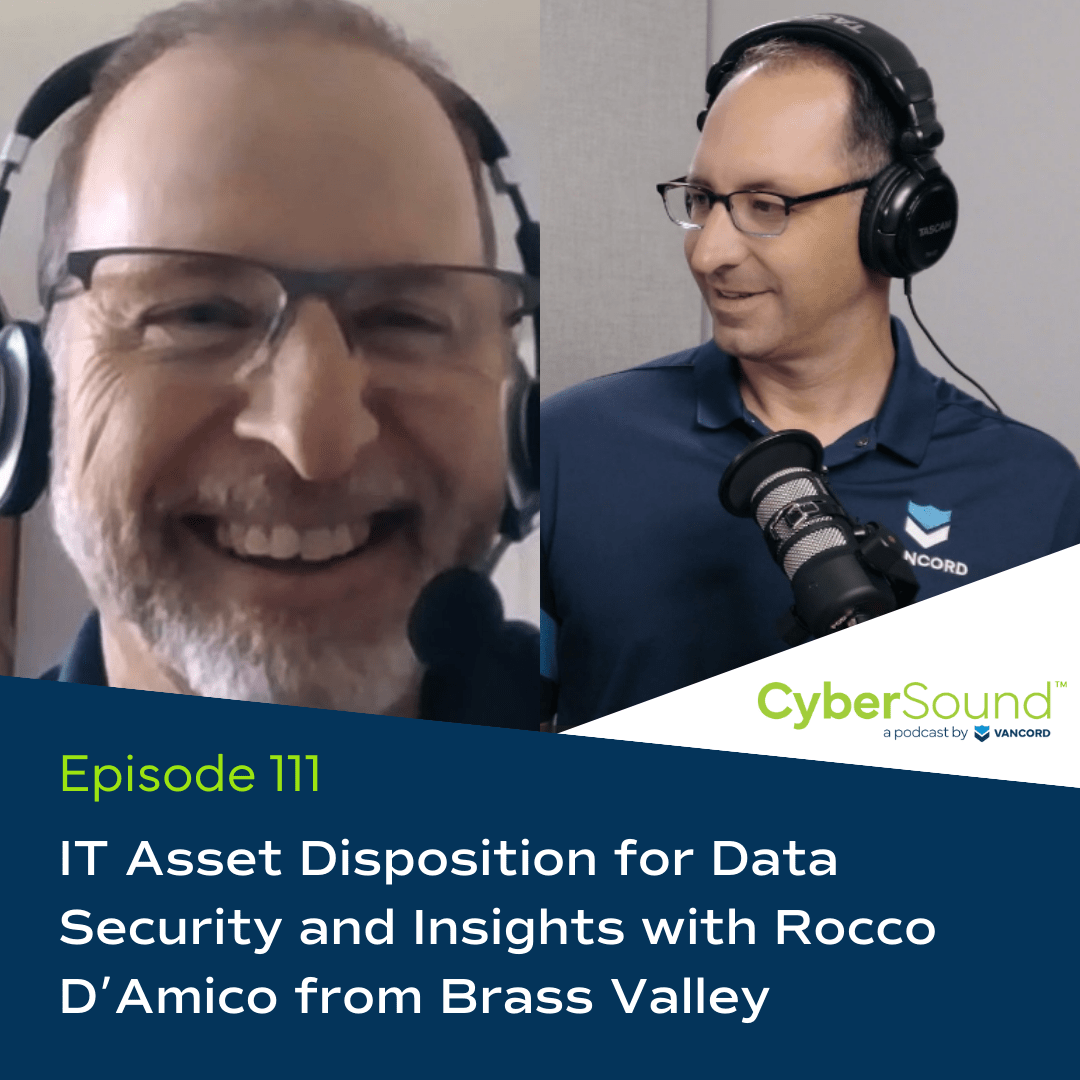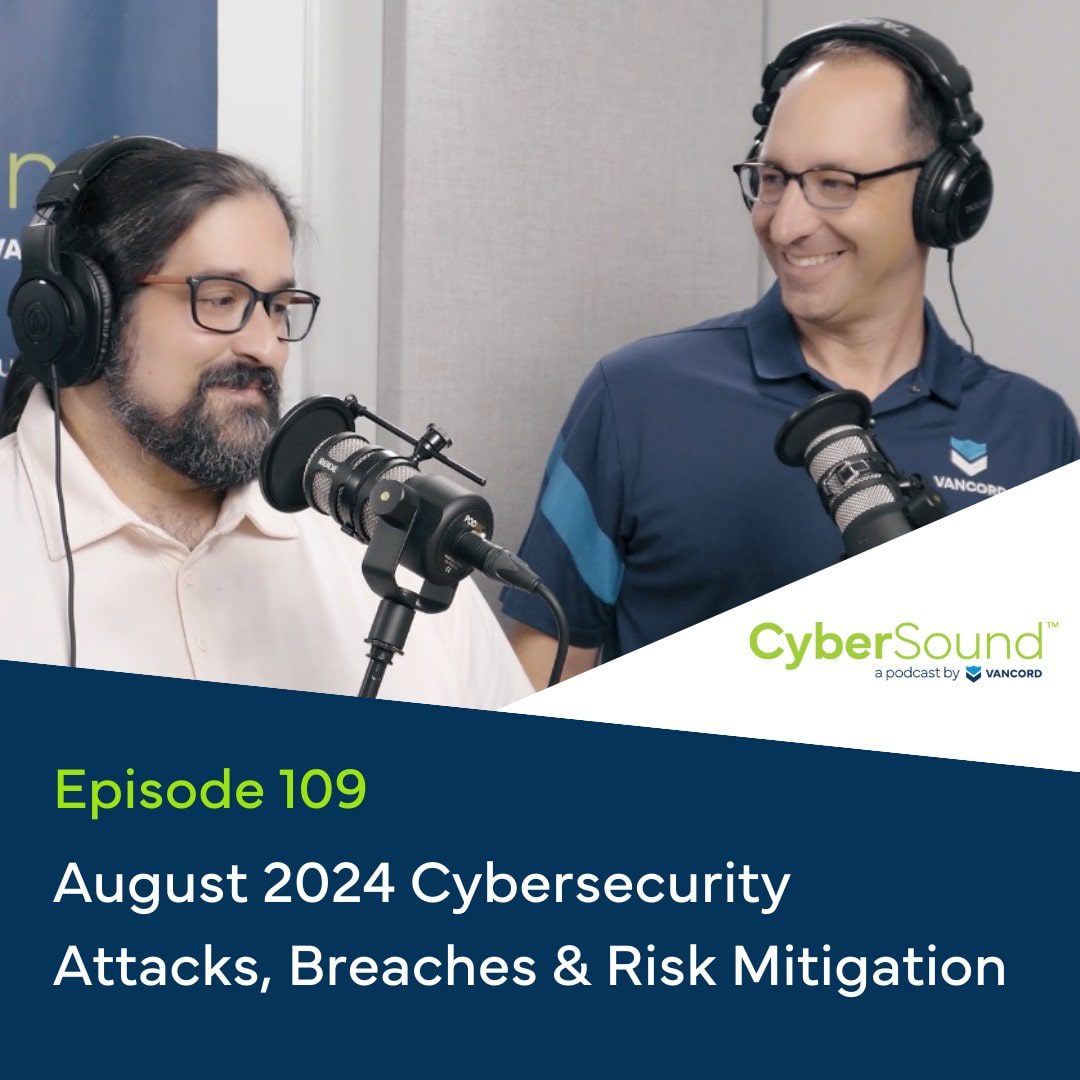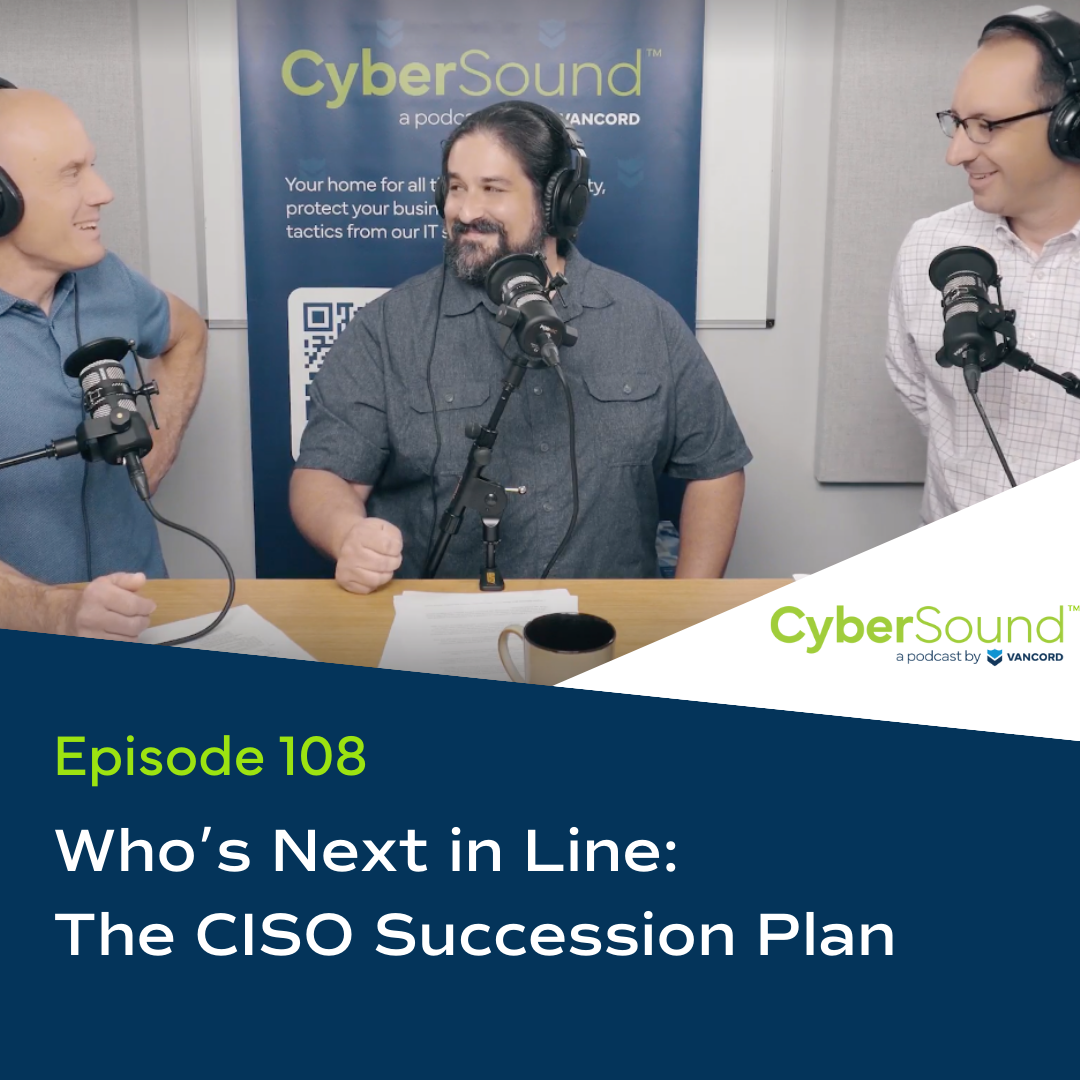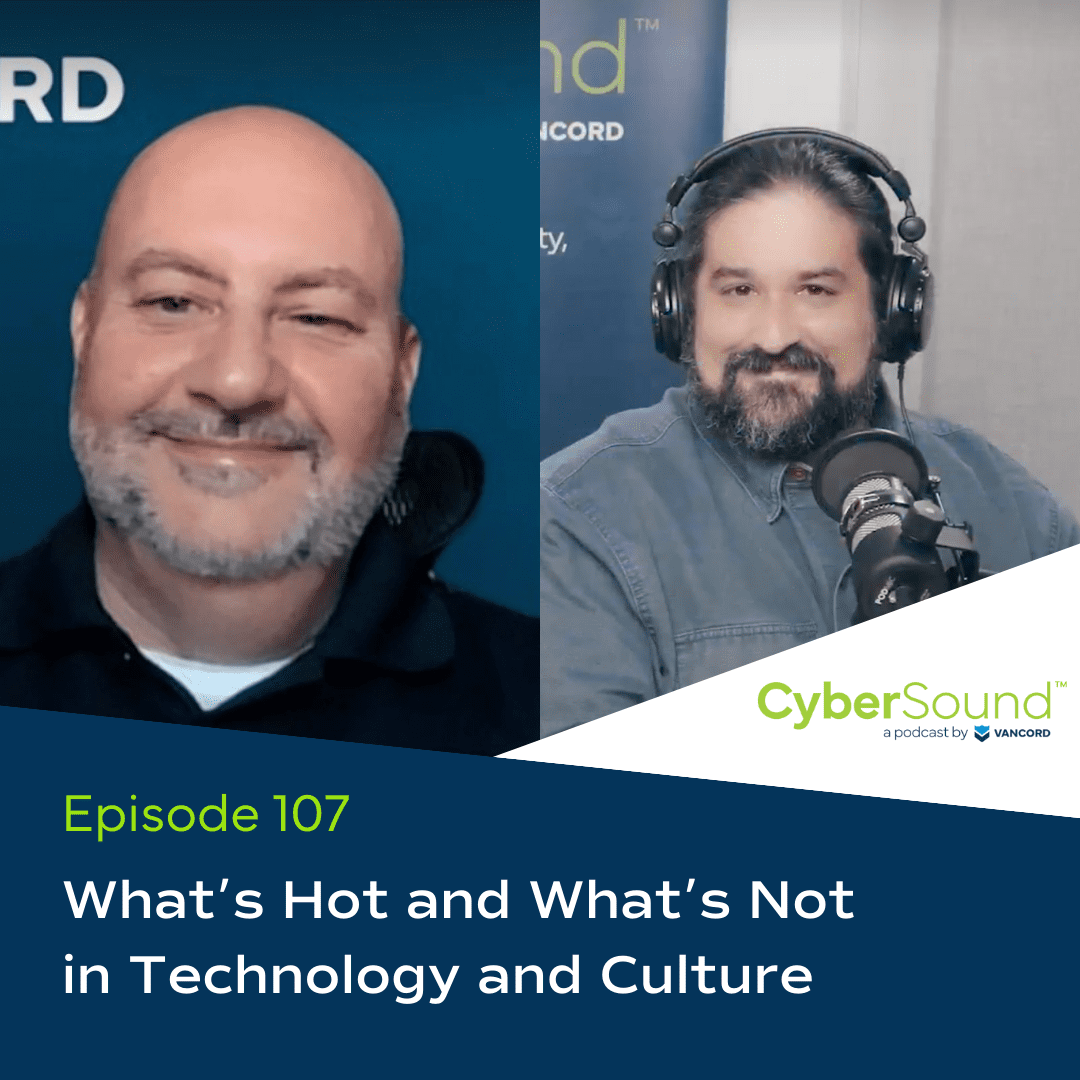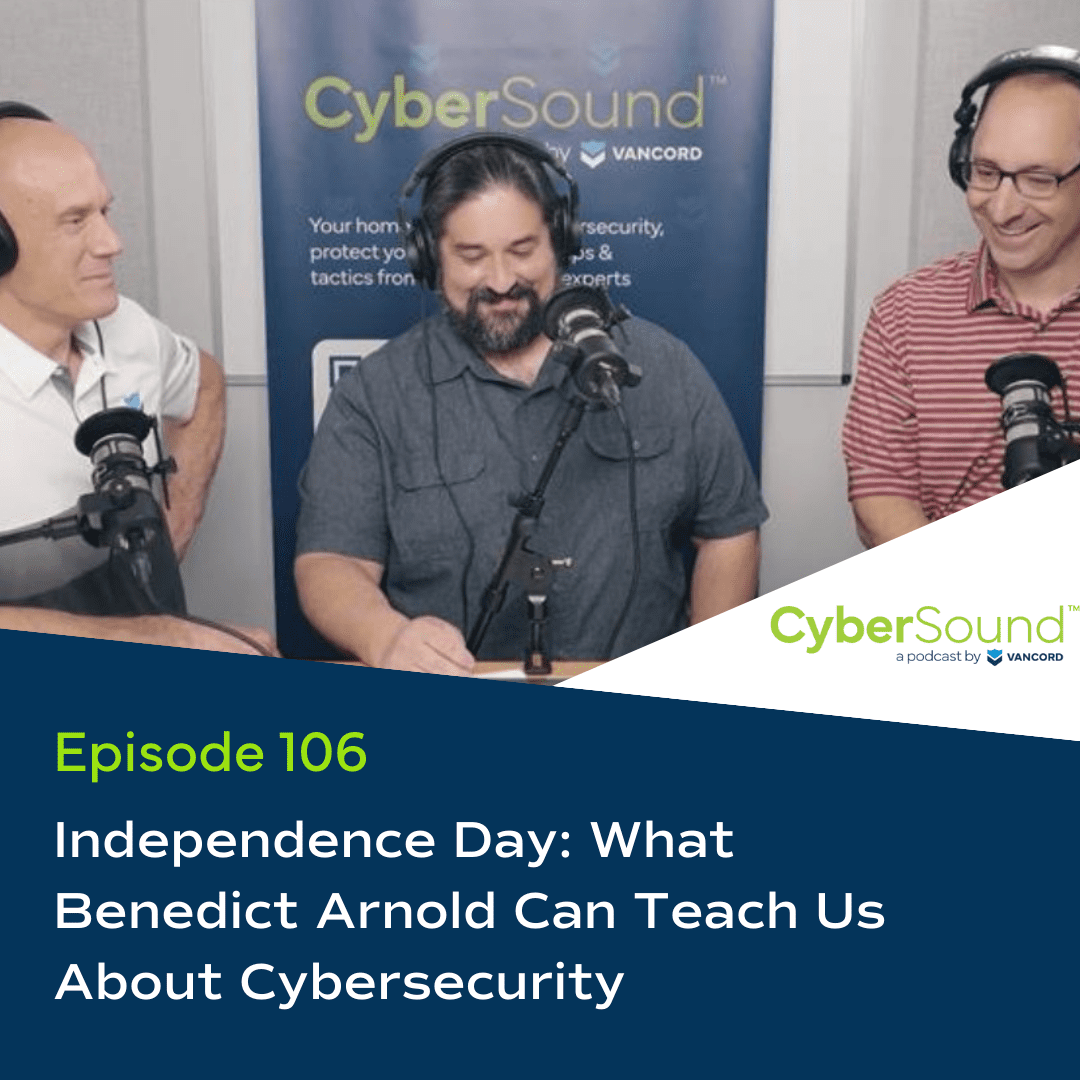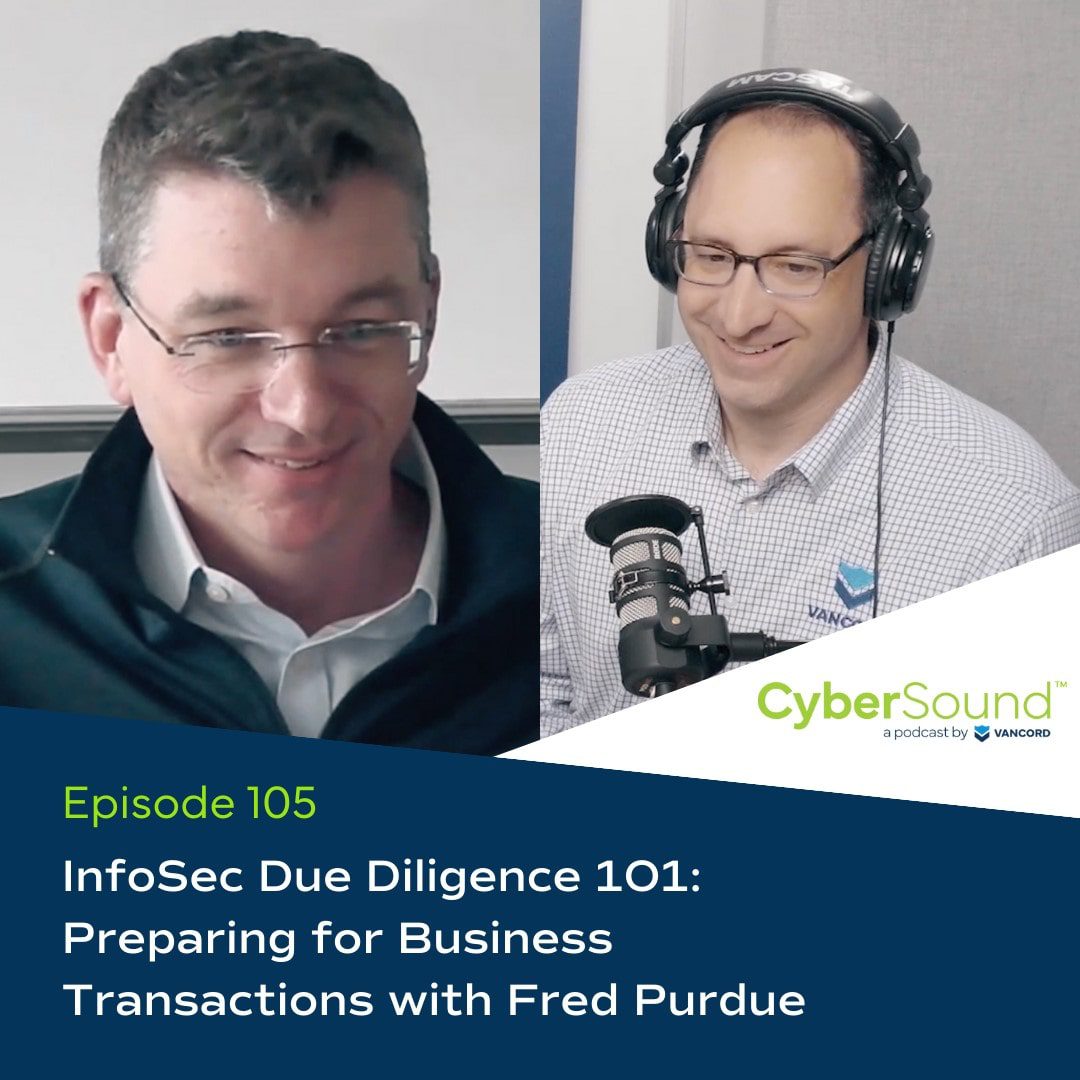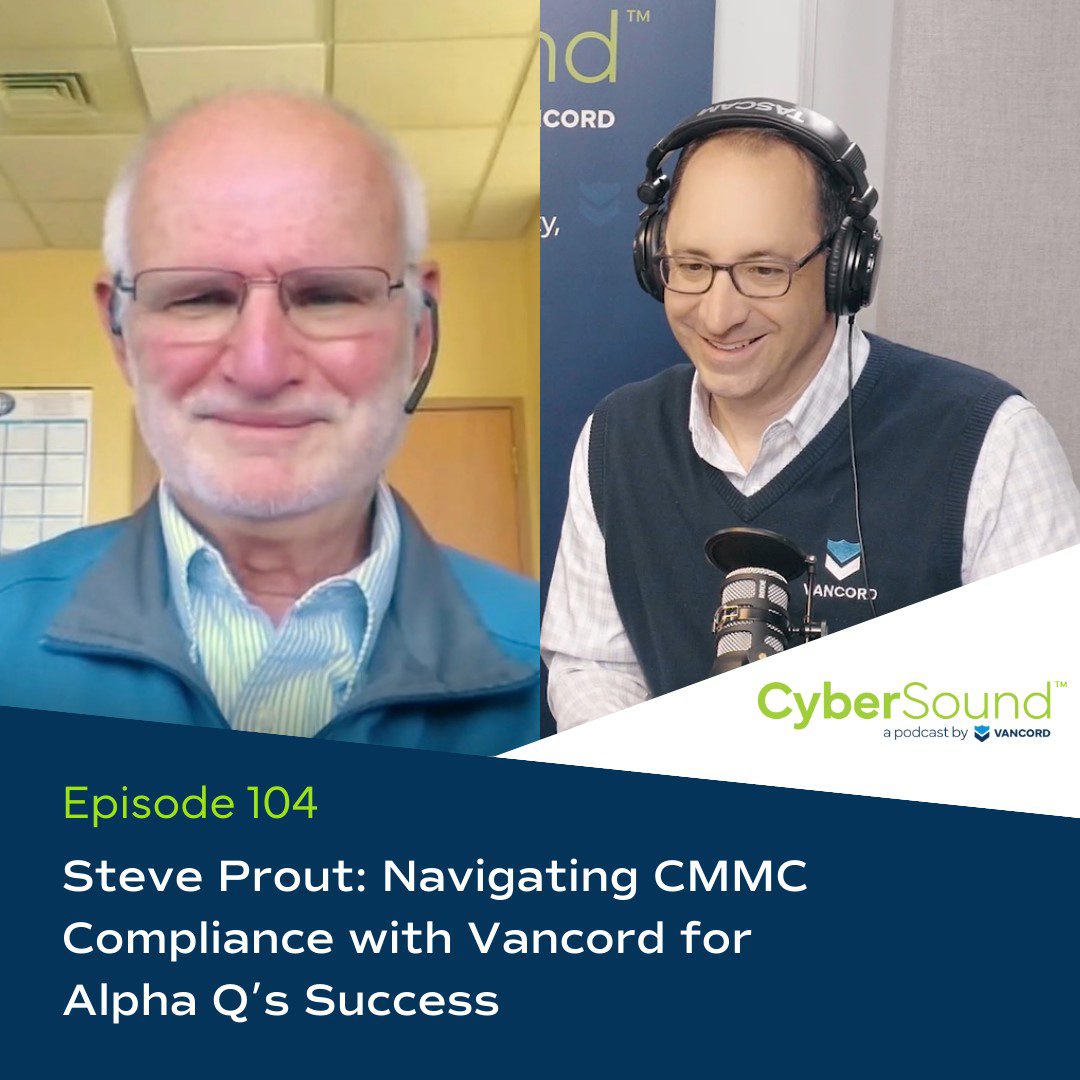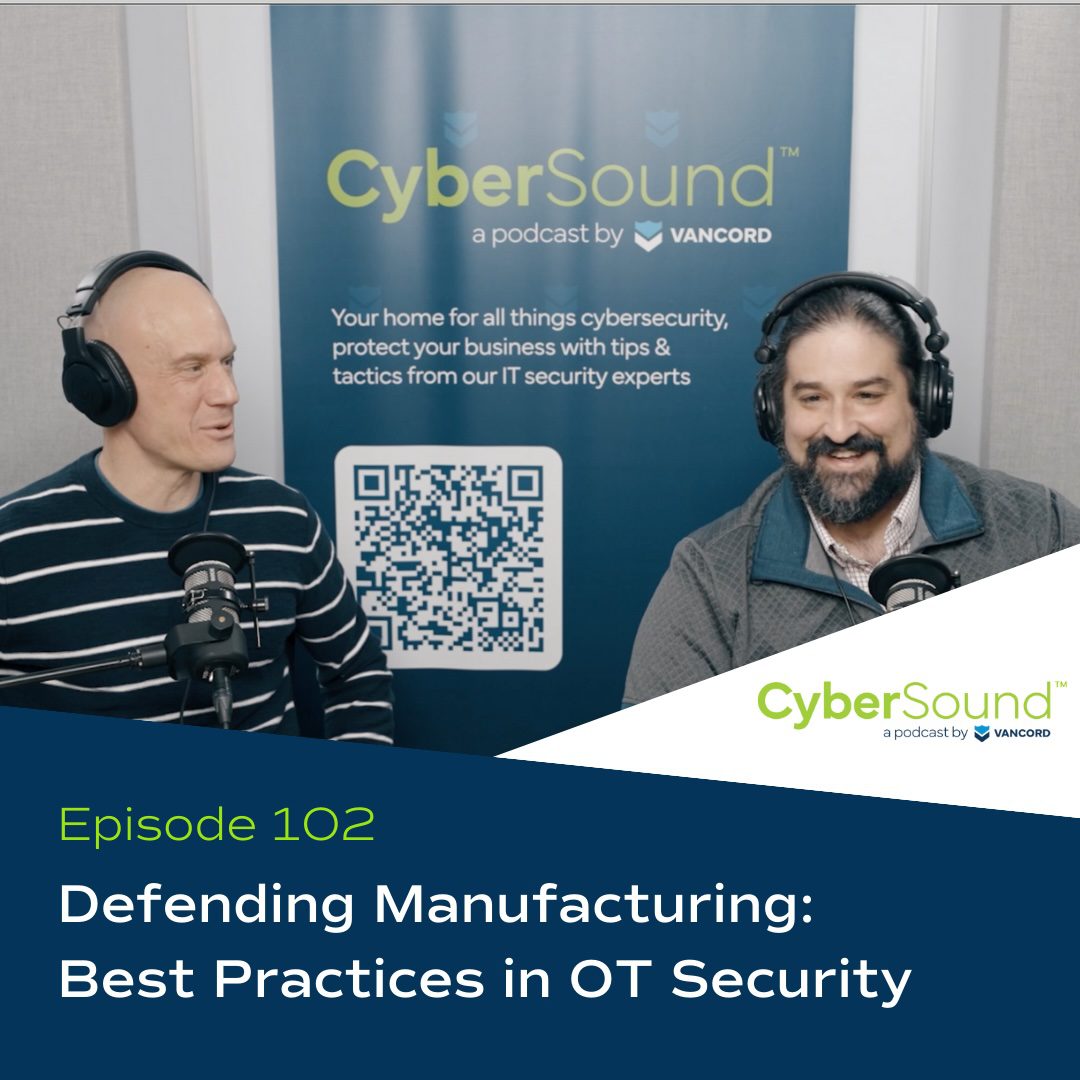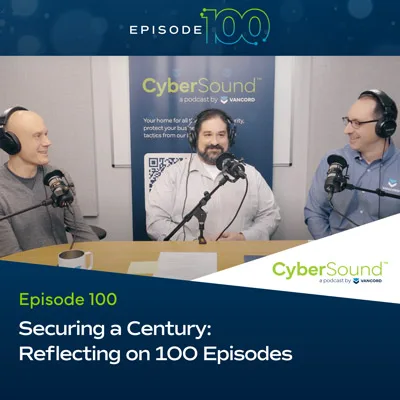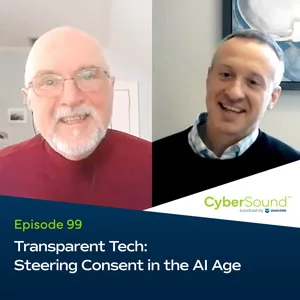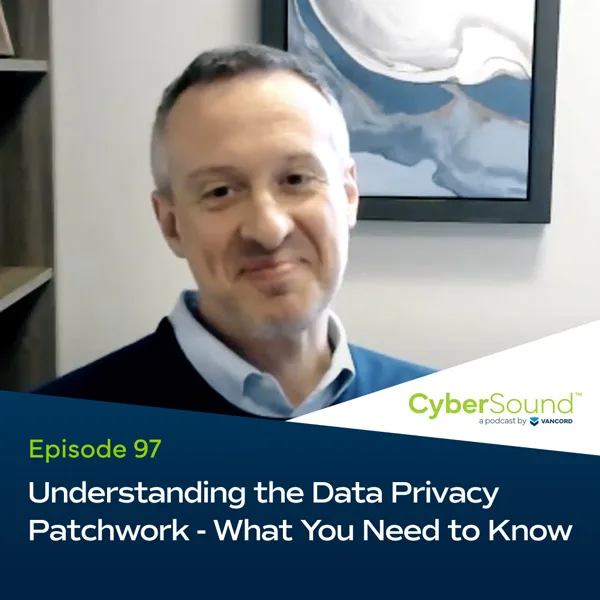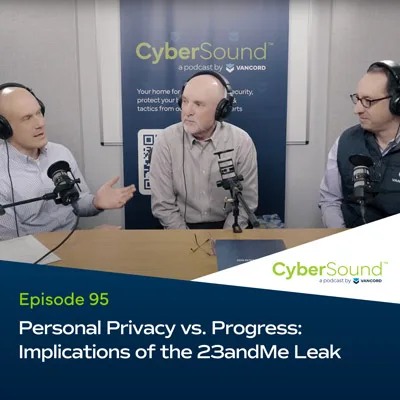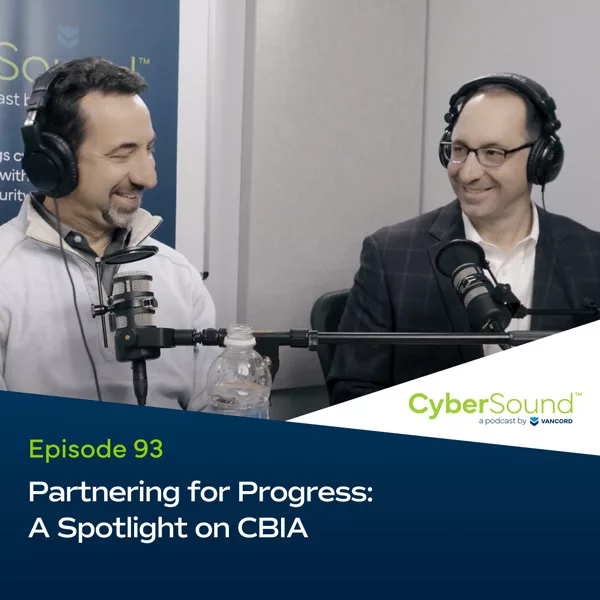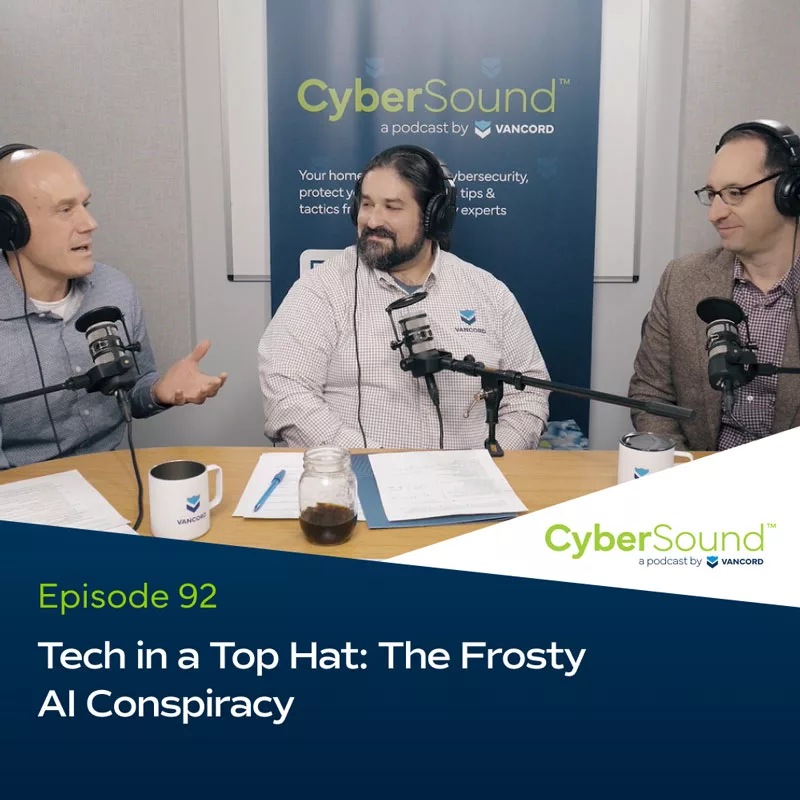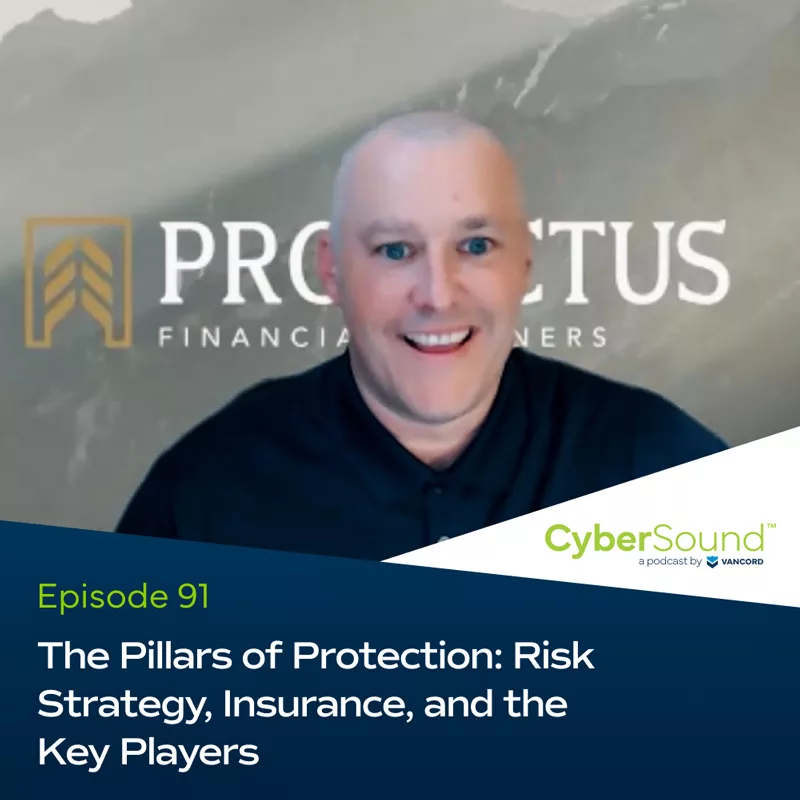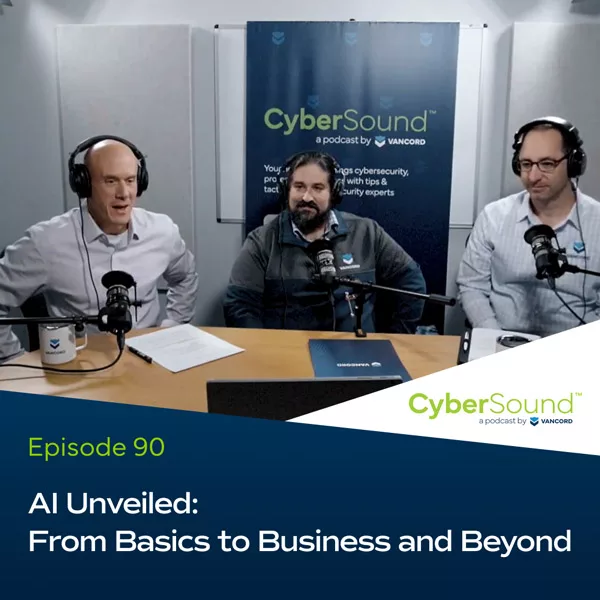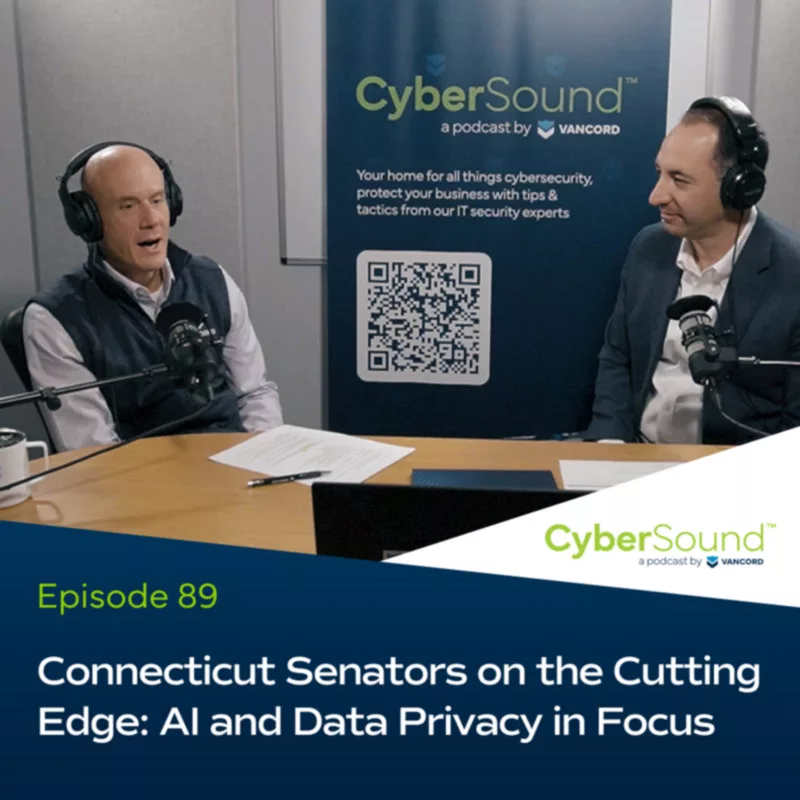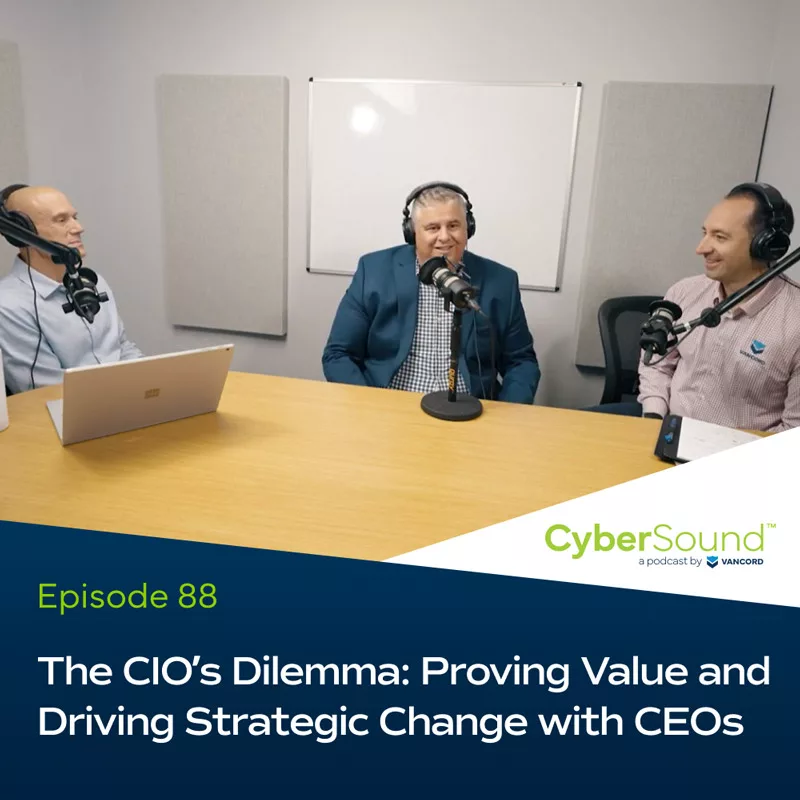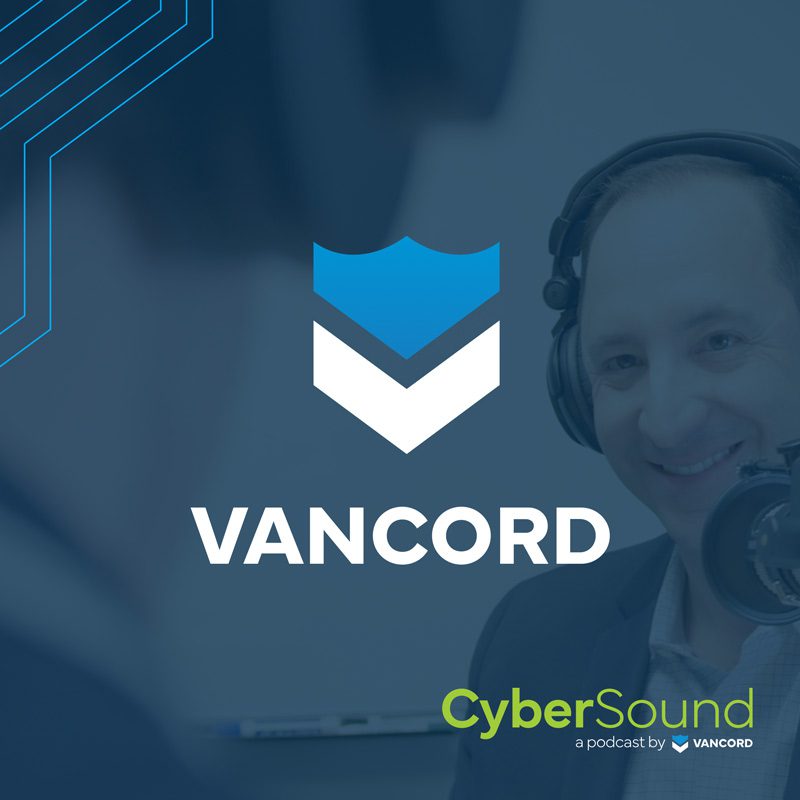Episode 138
Listen to this episode on
Episode Transcript
Speaker 1 00:02
This is CyberSound, your simplified and fundamentals-focused source for all things cybersecurity.
Jason Pufahl 00:10
Welcome to CyberSound. I’m your host, Jason Pufahl, joined today by Michael Grande, remotely. Thanks Mike for joining and Steve Bernet, Partner at Fintelos, Steve is actually working pretty closely with Vancord as part of our finance team. He’s our fractional CFO. So Steve, welcome today.
Jason Pufahl 00:31
Yeah, it’s great to have you, really wanted to start off, you know, we it’s kind of interesting. We were chatting about this a little bit, you know, we’ve had a virtual Information Security Office offering for years, and we’ve got …
Speaker 1 00:02
This is CyberSound, your simplified and fundamentals-focused source for all things cybersecurity.
Jason Pufahl 00:10
Welcome to CyberSound. I’m your host, Jason Pufahl, joined today by Michael Grande, remotely. Thanks Mike for joining and Steve Bernet, Partner at Fintelos, Steve is actually working pretty closely with Vancord as part of our finance team. He’s our fractional CFO. So Steve, welcome today.
Jason Pufahl 00:31
Yeah, it’s great to have you, really wanted to start off, you know, we it’s kind of interesting. We were chatting about this a little bit, you know, we’ve had a virtual Information Security Office offering for years, and we’ve got a lot of clients that take advantage of that. And when we were chatting through this, and we were talking about AI and some of the things that we want to cover, it occurred to me that it’s kind of a neat opportunity to really to demonstrate that not only do we offer the model, but we believe in it enough that we actually, you know, take advantage of it. So, you know, kind of a nice little segue, I think. And maybe if you can spend a minute on sort of what your company does, what your role typically is, and, and how sort of use that fractional model,
Steve Bernet 00:31
Thanks. Thanks for having me.
Steve Bernet 01:17
Yeah, well, again, thanks for having me super excited to have the conversation today. So quick background myself and I’ll describe kind of what we do at Fintelos. So been a financial practitioner for almost two decades now. Have spent time all across the world in finance, from capital markets into corporate finance the past decade plus, really, I’ve spent time working with high growth technology firms focused around, kind of operational challenges scaling their business, and ultimately, I’d say capital structuring and events beyond that. So kind of how that translates, one of the one of the opportunities or problems that I saw kind of existing in the space is finance is a strategic function for a lot of high growth or technology oriented businesses is kind of adopted too late in that usually there’s not the budget to bring on a full time CFO, owners or CEOs are trying to see the value, or in some instances, right, they kind of play that role and don’t see the need for an additional individual. But often tell us, right, we really value and see the need for Strategic Finance as a function within a lot of these high growth firms. So, you know, we are a Strategic Finance partner for CEOs, investors, founders and high growth businesses specifically focused on B2B software, or subscription software and tech enabled services businesses. My partner, Chris, and I have been doing this about two, two years at this point, right? And we’ve loved the journey. And we love working with with founders and investors to scale businesses.
Michael Grande 02:52
So that was, that was a great overview of the services that you guys provide. And sort of these, like we said it before, yeah, exactly. He’s got his elevator pitch, perfect, yeah. Might have read the website there, right? What was, what was the business need, or the opportunity that you saw in the market when, when you and your partner sort of decided to launch and tell us?
Steve Bernet 03:17
Yeah, and for further context, right? So we both had been in full time CFO seats at high growth technology businesses, whether those be SaaS businesses or services businesses, worked very closely with founders and investors, kind of scaling those businesses. Now there was a certain inflection point that brought us into those businesses. We saw value in those companies having our services in some form or fashion prior to us being hired? Right? It was almost like they were leaving something on the table, whether it be conversations with investors, whether it be conversations internally, of having kind of a data driven, finance oriented, topical lens to things where we could have been brought in earlier to do that skill. And so we felt like offering that in more of a consultative or fractional style of approach is a huge value add for a lot of these businesses where it’s just brought in too late, or there’s some sort of event that causes it to naturally happen.
Michael Grande 04:16
So, you know, I we’ve we’ve grown and evolved through the years. We’ve had different sort of roles, our finance operations, and I’ve spent a lot of time in that myself. And we had the benefit of having sort of a senior finance director or CFO for many years. You know, talk about sort of the primary benefits that you have seen working with some of these companies. You talk about high growth, right? But generally it also means also means starting small, getting bigger, scaling, sort of, what are the areas, maybe some of the struggles that you’ve had to deal with and and also some of the benefits long term?
Steve Bernet 04:53
Definitely, well, in a lot of the businesses, well, I’ll kind of, I kind of bifurcate that, a little bit of, sort of a bootstrapped, founder-owned, or closely held businesses to kind of investor backed businesses, because I think those answers are a little bit different. But on the kind of bootstrap, founder-owned style of businesses, right? It’s really the shift in mindset of, rather than operating the business with your gut, actually using data to support some of the decisions in the strategy, right? It’s the toughest thing, right? You know the business has been your baby. Your gut really might even be, in some instances, as good or as foundational as using data to drive decisions, but ultimately, taking some sort of data set, taking some sort of way to quantify but also measure kind of performance of the business, and implementing that, whether it be around KPI structure, whether it be around some sort of operational initiatives or other things, that’s really kind of, I would say, the big inflection in that world now flipping to the investor side of the world, you know, around those conversations, right? There’s an actual point where it makes sense to have someone like us involved in those conversations, to represent the business, whether it be crafting a narrative, crafting, you know, data that we would be sharing to the investors, but ultimately, post kind of investment, call it, there’s this sort of requirement or expectation around reporting being a certain way, you know, forecasting and planning being a certain way, just communication internally, being a certain way that, you know, we can help provide and play that function.
Michael Grande 06:21
Would you say that there’s sort of commonality, maybe, going back to the founder run, non investor backed businesses, sure, sort of some common issues or sort of blind spots that as they’re growing and scaling that you’ve run into or you’ve seen and had to work through?
Steve Bernet 06:40
Yeah, very, very good question. I’d say, I’ll kind of boil there’s a lot, and that’s no negative against founders, right? But just of how we think and view the world, I’d say that a few that I would call out one a lot of founders, depending on where they are in their journey, right? They ultimately run their business by their bank account. Right? How much cash is in the bank account determines the health of the business. Think shifting the mindset away from that into really looking at some operational performance metrics and or related to that. And I would say this is a second point, is just getting reporting in a way that it makes sense to operationally run the business. A lot of companies tend to just have their accounting or books just be done on a cash basis, right? And so shifting to more of that accrual, making sure revenue and expenses are being recognized in the proper months, and really understanding kind of the true flow of the business from operational data perspective, those, I would say, the two biggest ones that come to mind, and then ultimately from there, kind of building off of that, right? Coaching a founder. You know, one of the things we see time and time again is, you know, founders and CEOs and really the executive in general, they’re the best sales people for the business, right? But the way that you then talk to the investment community about your business is totally different than how you talk to customers, right? So understanding the narrative and how to portray that to different types of individuals, whether they’re looking at your business from an investment standpoint or a growth standpoint, whether they’re looking at your business to you know, are you selling them your services or software? Right? I think those are two different narratives, and so understanding how to communicate to those two different parties is super beneficial.
Michael Grande 08:21
You know, I one of the, I wouldn’t call it a challenge, but one of the unique aspects of some of the services that we offer, similar to our vISO is sort of cadence. And, you know, meeting cadence and understanding how a good engagement and relationship works, obviously, everything is always predicated on trust, right? You know, do you have you found sort of the secret sauce when it comes to the best way to keep in touch? And I know that we’ve, we’ve established different sort of modes of communication that work best for us, but you know what? What do you see in the market?
Steve Bernet 08:57
Yeah, I’ll give you the consulting answer to this, right? It depends, right? Because, you know, I hate to say it, but every customer is different, right? I think taking a step back from that right, like the value in being successful in this style of deployment, whether it be vISO, whether it be, you know, a CFO style engagement, whether it be a sales outside sales, is really understanding the culture of your customer, right, and understanding how to best interact with your customer based off of that culture and that recognition, right? So some customers, you know, you know they want, you know the expectation is you’re there on a chat or you’re there in meetings and other things, right? And they want you kind of participating, you know, other customers, right? It’s a weekly call of just running through priorities, running through lists making sure, you know, they’re getting the output they want. I’d say ultimately, like our goal at Fintelos is we’re selling you a strategic function, not necessarily capacity or specific output, right? I think shifting the mindset away from like a deliverable or time or other is what you’re delivering, but more you know value creation and kind of, you know, I’d say process assistance or really improvement around how the business is operating. Think that sort of determines, and don’t get me wrong, we do both styles of those engagements, right? But that really determines kind of what the interaction would be like and how we kind of deploy our services ultimately from from our lens, right? We want to be as strategic as possible in our delivery and as little in the tactical execution as possible. We, you know, would either hope or help the team that’s in place today to kind of deliver on that. So for us, it’s a lot more kind of advisory or strategy looking than it is from a day to day. Hey, are you going in and paying this bill or something like that from a finance standpoint, right?
Michael Grande 10:46
You know, sort of trends as it relates to sort of capital markets. Everybody talks about the massive amount of money that’s available in both private equity and sort of in capital right now, and people are looking to deploy and from your perspective, maybe give us, give us your take on, on what you see, sort of market dynamics right now.
Steve Bernet 11:07
Yeah, good question. I’d say, you know, we definitely saw a top, or, you know, a peak in capital markets in 2022, 2022 was a really interesting year. In that beginning of the year, everything was wild, right? Valuations were at all time highs. Everyone felt really great about both commercial markets, but also capital markets, right? Going in the back half of 2022 there was a lot of fear around this recession that’s still here today, apparently was coming about, right? And so from an investment standpoint, we saw investors get a lot more, I’d say, disciplined around deploying capital. And I said that led into 2023 and the early parts of 2024 saw a big shift in the investment community, in growth at all costs. That mindset shifted to modest growth with reasonable profitability, right? And so bringing kind of things back to like, hey, we want to underwrite anything with extreme growth, because there’s future potential to that to like, let’s be real with this. And let’s say, hey, we want growth, but ultimately we want some sense of, you know, the business economics being profitable, right? And so that kind of shift was, was played out in 2023 I’d say, you know, I don’t know all the data on this, but a lot of I would say the mid market, SMB investors kind of a risk off in those years. And I’m guessing the data would show, kind of the number of investments significantly pulled back 2024 now into 2025 right? I think they realize they need to play a little bit of catch up. We’re in the new reality. We’ve kind of understand where rates are going to be, or have been, and are kind of trending, right? You know, I’d say rates, you know, although it gets a lot of press, right, it does influence the underwriting of some of these business from an investment standpoint. So it’s very important to, you know, keep debt markets in mind, especially from the private equity world. But ultimately, that’s led to kind of this disciplined growth, to deploying capital around, wanting to see growth, but it’s supported by, you know, profitability. And I’d say that’s extended into 2025 as well. 2025 as well. We’re starting to see valuations creep back up again. We’re starting to see activity creep back up again. I’d say in tech and tech services, you know, in the event, you know, we talked a lot about private equity, but even in the growth equity, down to the venture community, right? You know, those investors just kind of reshaping thesis, and I’d say ultimately, in the whole community, reshaping hold periods really is a result of that kind of trend from 2022, to 2024, and that a 357, year hold period time horizon for investors is now turning into a 579, year hold a hold period time horizon, right? But ultimately, I feel like capital markets are healthy right now, investor activity is healthy, particularly in the space the Vancord plays in technical services, businesses are getting a lot of looks. I’d say the other trend, kind of, beyond capital markets, that we hear a lot about, right, is this transition of net worth from kind of Boomer to, you know, millennial Gen X, or Gen X millennial into Gen Z. And that we’re seeing a lot of founder led businesses start to trade in that, you know, founders reaching their 50s, 60s, even beyond right, bending these in these businesses with no defined exit plan, starting to think about what that looks like. And I think that’s causing some, some good, you know, activity, and some, some names and businesses that trade that historically have kind of scaled independently on their own.
Michael Grande 14:19
You know, the big buzzword. It comes up constantly. It’s something that sort of everybody wants to talk about outside of, maybe in the tech world, right? M&A, but, you know, AI, right? So it’s always, it’s always an acronym for something, but you know when, when, when I’ve sort of been paying attention to what’s happening, you hear a lot of changes happening in the accounting world, right? There’s been a lot of sort of change from, not only sort of mandates, we talked about revenue recognition requirements, and that’s a whole headache for a lot of different companies, but you know, sort of what the role that AI will play, sort of in the future of sort of corporate finance and things like that. Yeah, what’s your opinion on it? What’s your thoughts? Where do you think it’s going?
Steve Bernet 15:03
Have a lot of opinions, and I’d say, ultimately, excited about the opportunity. You know, they kind of set the backdrop of that. One of the things I like to just use to frame the picture, right? Is like, AI, particularly in a B2B or business deployment, right? Like, it’s sort of gotten a lot of interest in the revenue generating functions. So think sales, marketing, maybe even customer support and some of that lens, right? Because there’s direct line to revenue accretion from using AI, right? Finance ops back office, right? It’s more or less a cost control or reduction or efficiency type of play, right? So I think we’ve seen a lot of really good use cases in AI and operating in the SMB world around some of those revenue generating functions. Not to say finance has been an afterthought, but ultimately, I don’t think it’s has been moving as fast as we’ve seen in some of those other respective industries. We’re now starting to see it, right? So the models are now getting smarter. And I think the other thing, just to keep and I’ll use the finance lens specifically is, you know, ultimately, we’re talking about language models as the engine or driver for a lot of this AI conversation, right? Language models are great with language right? Finance is all quantitative, right? So you think about prompting a language model them, taking quantitative data, right, analyzing it, and then prompting it back to you in language with maybe a little bit of quantities. You know, it’s we had to go through that progression now with the models to get to a point where it really understood that it understood how to present quantitative data in an effective manner, and all that, that sort of stuff, right? So think we’re beyond that. Some of the cool trends we’re seeing today, I ultimately view AI and finance in the phase that we’re in now, right, as being one of the best acceleration tools out there, right? And that, do I think, you know, everyone says, AI coming for your job. Do I think it can replace the role of a junior or mid level finance person today? Absolutely not, right. But do I think it can do parts of those functions and accelerate them right, either them or others, on the output of what those individuals expect to do? Absolutely right? And so I think we’re seeing that now with some of the tools. Some of the tools you’re talking about, right, kind of broader vision, I think, from from my side, right? As we look forward three to five years, think ultimately, a lot of the pieces of finance or accounting or back office that are very formulaic, like accounting, I think AI does really good at disrupting those industries, right? Bookkeeping being one of them, not to pick on anyone the accounting world, right? But bookkeeping is a great use case for AI to understand, hey, you know, here’s a debit, here’s a credit, here do I how do I apply these transactions? Right? I think it’ll do really well at that. And so ultimately, to boil that long winded answer up, right, like AI, I think is one of the is going to be an amazing acceleration tool for the delivery or the implementation of more advanced finance. But ultimately, we haven’t seen yet where it’s really going to replace the full Office of the CFO.
Michael Grande 17:51
It’s really sort of like that force multiplier when it comes to a lot of the roles and sort of expediting certain tasks and moving it forward. You know, one, one conversation I did have with someone was that sort of the prior roles of a lot of offshoring that was taking place, maybe some back office stuff is now going to be replaced with AI and, you know, maybe there’s some, there’s some benefits to that locally and for some smaller firms,
Steve Bernet 18:16
Yeah. I think a lot of like, repetitive or documentable tasks that are done over and over again and follow a very formulaic process. You know, AI works great at sort of accelerating those, you know, and, you know, in some instances, kind of automating them.
Jason Pufahl 18:37
So we joked a little bit the beginning of the podcast said, maybe you have Mike, you were going to run this. This has probably been the quietest I’ve been on a podcast.
Michael Grande 18:46
It might be, it might be.
Jason Pufahl 18:46
And looking at the time, I’m thinking, Well, we were still hit over 15 minutes, so maybe it’s not all meat every time that causes the overtures.
Michael Grande 18:55
Well, you know, we have loquacious guests from time to time who really are experts in their field, and sometimes a loquacious host who can keep us moving. So I’m happy to jump in on some of the sort of general business topics, and and, and, and understanding, sort of how we engage with different firms. And I thought that the linkage between some of the services that we offer over the last several years that where we’re sort of assisting and and helping different types of clients and different industries sort of navigate compliance and regulatory burden and things like that. And what Steve can do for for growing clients and understanding sort of how to take advantage of capital markets if that’s something they want to do. And with finance, you know, through traditional, conventional financing, through banks and other other funding methods. So, you know, I think it’s a great service. I appreciate sort of the relationship that we’ve been able to build and the network that we have built together as well. So I appreciate you being on Yeah,
Steve Bernet 19:56
Likewise, I appreciate you guys having me. I’ve enjoyed kind of the conversation today and work with you guys a little bit further, so look forward to where that takes us.
Jason Pufahl 20:03
That sounds good. Steve, thanks. I appreciate you joining right, take care.
Speaker 1 20:08
We’d love to hear your feedback. Feel free to get in touch at Vancord on LinkedIn. And remember, stay vigilant, stay resilient. This has been CyberSound.

